#i remember being the antagonist (now a young adult) with his child self running from a monster
Explore tagged Tumblr posts
Text
guess who showed up in my dream last night!
if you guess “early hobbit cartoon gandalf” then you were right!

#my dreams#time travel dream#i should elaborate more because it was a complex dream that focused on the protagonist AND antagonist and had two separate eras#time-travel to the past plot and post-plot where the antagonist had to learn to live with himself after#old man gandalf was a wizard named 'bulo' who was ??? very cryptic and responsible for some of the time travel stuff i think.#i remember being the antagonist (now a young adult) with his child self running from a monster#(baby self had just found out i was him because we had the same disability which included muscle spasms in our bad leg)#(i think i was a student teacher because i was trying to make sure he wouldn't turn out like me)#but anyway we were running from a monster and spotted bulo outside the window#well my baby self did and asked who it was#and i remember banging on the window and screaming for him. which is the only reason i know bulo's name#and he looked at me. and he *looked* at me. and then he turned away.#and i remember the feeling of utter betrayal and helplessness because fuck. i knew i'd been a villain. but baby me was still just like#he was just a shitty kid?? a bully maybe but we were trying to get better#protagonist had an easier time of it because he time traveled as school ended and his baby self was leaving to live in miami#so when we returned to the future still in our grown bodies. he became a student teacher as well but didn't have to deal with his baby self#shoutout to my evil druid friend though who was also trying to help save baby me#well she wasn't like EVIL evil but like. i think she was corrupted and protagonist ended up saving her#but we were 'previous antagonists fucked up by what we had done' solidarity#i think i kidnapped her in the past at one point??#she just fucked off to live in the forest and didn't even talk to protagonist after everything i think. maybe out of shame#but me (antagonist) and her (i think her name was iob or ios or something with an i) were very very weird friends#bulo you fucker#to clarify we like. time traveled as seven-or-eight year olds into the past (????) and grew up there before being slingshotted back
6 notes
·
View notes
Text
Tangled Salt Marathon - Secret of the Sun Drop (Part 1)

Were now at the season finale folks and it’s the beginning of the end. This is the series’ highpoint, it’s all downhill afterwards. However, while this episode is good, it’s still got flaws so let's get to it.
Summary: On Rapunzel's nineteenth birthday, Frederic tightens his grip on the Rapunzel and the kingdom, while Varian makes his move to attack.
More Indication of the Timeline
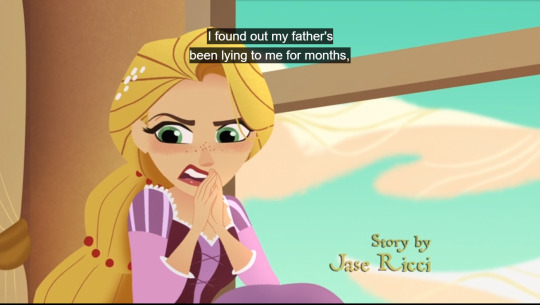
Remember, Varian said that it would be matter of months until the rocks reached the island in QfaD and today is the day that they reach it. Now Raps is saying that Frederic has been lying to her for months. At least since TWoRR, which makes more sense if you remember that that particular episode was meant to slot between QfaD and this episode.
The show has a bad habit of making the passage of time an important plot point but failing to showcase how much time has past. Showing episodes out of order didn’t help, but even more than that the audience shouldn’t have to rely on one line exposition to gain knowledge of what’s going on. The show fails to use actual visual indicators of what’s going on. There’s little visual change in seasons, next to no change in character models, and all we have are made up holidays to go by.
Also yes, Rapunzel has left a fourteen year old alone for three months. This isn’t something that can be excused. Seriously, stop trying to do so people. It just makes you look bad when you do.
Wow, Way to Victim Blame, Raps.
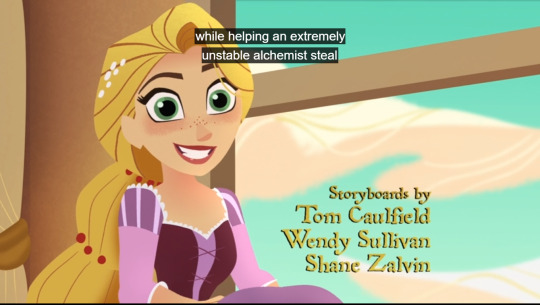
“Unstable”? We’re seriously going to use ableist terms to describe a grieving young teenager who’s been persecuted and neglected for months on in?
And Rapunzel knows he’s been persecuted and abandoned for months at this point. She’s read the note. She’s been attacked by same the guards that attacked him. She’s heard the rumors. She seen his father’s corpse. She has just admitted in this very spiel that Frederic has been lying. She knows how people are unfairly treated by Corona’s legal system and that ‘treason’ is a death sentence to anyone but herself.
Yet, all she can do here is whine about how all of this only affects her. This entire speech is just me, me, me, and I, I, I. Don’t tell me she’s a kind and compassionate person when her hypocrisy is made into a fundamental plot point for the season’s main conflict.
But let's get to the real reason for this little recap. It’s to create bias in the viewer.
The viewer is aware that Varian might be up to something, but Rapunzel logically, should not be. Varian technically hasn’t done anything wrong yet. The worst he’s done is feed people truth serum, which is no different than Xavier drugging folks with the mood potion. Given how Raps didn’t care about Xavier doing that she shouldn’t care about Varian doing it either, especially since it didn’t physically harm anyone. Also Varian very much is in the right to take the flower and she knows the only thing he’s going to use it for is to free his father and possibly stop the rocks. He’s been very upfront about that.
Also don’t you dare bring up the stupid reprise! Intent isn’t action. You can't condemn people for having negative thoughts. You can only condemn people for acting upon their negative impulses, which, once again, has not happened yet.
Furthermore, Rapunzel isn’t privy to Varian’s innermost thoughts and hasn’t been present for those instances where he did voice negative intent. Ergo, him singing a misplaced reprise does not excuse her behaviour.
The characters in the show treat Varian as a villain before he ever actually becomes a villian, and that’s only because the creator wants you to side with his self-insert instead of actually addressing the moral conundrums that he’s written into the show.
Does Anyone Else Besides Me Find the Glorification of Classism In the Show Disturbing?


So supposedly all of these gifts have been given to Rapunzel by the regular citizenry of Corona. There might be a few from a couple of lower nobles or royals from outside of Corona, but for the most part it’s implied that all of theses presents are from poor people.
Rapunzel is a princess. She’s literally the richest person in the whole kingdom and holds people’s lives in her hands. Giving a thoughtful gift because you like her is one thing, paying tribute to her very existence just because she technically owns you is another.
Keep in mind people have been brainwashed for nearly two decades to worship Rapunzel. They’ve made a holiday out of her birthday. Later on we see the townspeople defend the King even when it’s been proven that he’s done them wrong. They follow Rapunzel blindly through out season three. ect.
The people of Corona are dangerously loyal to feudalism, royalty, and authoritarian rule long past sanity, and given the other authoritarian messages in the show, it takes what is meant to be a sweet scene of a girl who grew up with nothing suddenly gaining acceptance and turns it into a creepy endorsement of the class system.
More Evidence that Frederic is the Worst

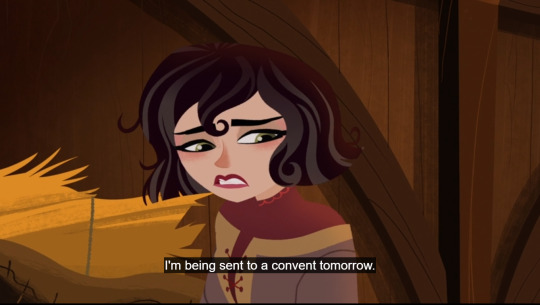
This scene makes it clear that Frederic is the one who is threatening Cassandra here, not her dad. It was never Cap who held the convent thing over her head. Now you can hold Cap accountable for choosing loyalty to the crown and his job over his daughter’s well being, but that is one of the few things that is actually addressed in the show, in this very episode in fact, so why would you?
Also, why only now? Frederic has known about Cassandra’s involvement since TWoRR when he first read Rapunzel’s diary. It’s strange he’d go out of his way to silence Varian for months on in but waits until the last episode to persecute Rapunzel’s bestie. You could argue that maybe he didn’t wanna risk tipping off Rapunzel but then why didn’t this happen during TAR instead?
Once again the writer is playing favorites in order to create bias. It’d be suddenly a lot harder to excuse Frederic if he was hunting down Cass along side Varian as she’s a main character and you couldn’t keep that as a ‘read between the lines’ scenario. Which, incidentally, is why we never get a Varian focused episode to show his time on the run. You couldn’t get away with having the main character siding with your dictator self-insert if you actually visually showed him persecuting a helpless child.
Don’t Expect This to Go Anywhere

Rapunzel is rightly angry about this clear abuse, but then never brings it up ever again. It’s completely forgotten about after this point. Frederic is never held accountable for his actions.
This is the Point Where Varian Actually Becomes a Villian

Not the flower, not the truth serum, not the damn reprise, but here. This is the point where his actions cross the line. Violence, particularly violence against people who aren’t currently hurting you, is wrong. Varian is a villain, he does do bad things, and I’m not going to ignore that.
However, knowing where, when, how, and why he becomes a villain is extremely important in not only understanding the story but in also navigating the moral minefield that is this show.
Because Varian is still the victim even as he slides into the role the antagonist. There’s been no change in the power dynamics. His life is still under threat from the king. Every action he takes is a step to either free his father and/or defend himself from a corrupt government that would see him hanged just for daring to defy it’s dictator.
People defend Varian to this day, not because he has a tragic backstory, but because he’s been forced into a dangerous situation with little way out. There’s nothing else he could have done that wouldn’t have lead to his eventual untimely death. Because indirect violence is still violence. Frederic is no less evil just because Varian fights against the king’s indirect violence with direct violence.
Varian’s Life was Forfeit the Moment He was Turned Away During the Storm and This is the Show Confirming That
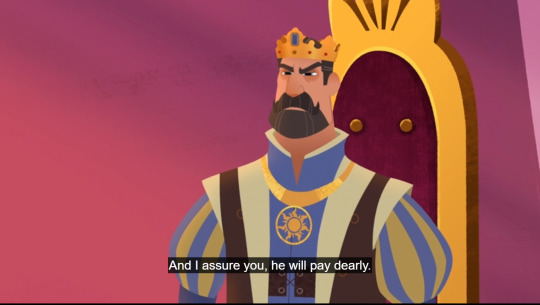
This is a grown man, with all the power in the world, threatening a child. A child who he has cannonly persecuted for three months before this incident. A child that was neglected by Rapunzel despite him being her responsibility.
Any excuse you give to defend either Frederic or Rapunzel is already made invalid by the simple fact that they are both adults and Varian is not. They are both in charge here, not the fourteen year old.
We do not hold people under legal voting age to the same standards as adults for two simple reasons. One, they are powerless in making the laws that they are accused of breaking, and two, they haven’t reached the point of development where they can take care of themselves and be expected to make rational decisions within a functioning society. Now we could have an argument all day long about the pros and cons of when the rights and responsibilities of adulthood should be granted to people (16?18?21?), but at fourteen/fifteen, Varian isn’t there yet regardless.
You can not in any good moral consciousness hold people lacking rights to the same responsibilities as those with rights.
That isn’t to say that kids can’t do bad things. They obviously can and have before. But when enacting judgement and the punishment that goes along with that, you have to keep their lack of rights in mind and make the sentence proportional to both their age, circumstances, and their crime. This is why courts that try teens as adults are absolutely vile. I do not care what crime they commited, you don’t do that.
I’m not criticizing Rapunzel and Frederic here because I personally dislike them or something. I’m criticizing them because I’m opposed to the messages that they become mouthpieces for. When you defend these two characters you defend their stance to persecute and abuse a child. Ergo, you spout the same authoritarian beliefs that are currently tearing my country apart and I will hold you accountable for it.
Like them all you want, but liking a character does not mean blindly going along with their bullshit.
This Still Abuse
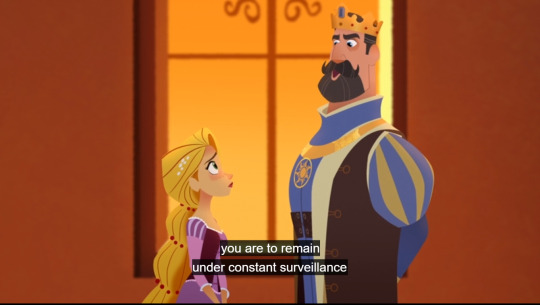
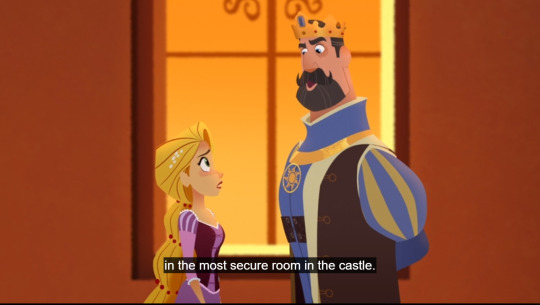

In fact it’s the same abuse that Gothel did to her. It was wrong then and it’s wrong now and there’s no excuse for that.
What a lot of people don’t seem to understand is that you can be both a victim and a bully at the same time. What differentiates Rapunzel, Frederic, and Varian from one other is their level of respective power in the situation and how their trauma actually impacts the rationale behind their actions.
Frederic is the most accountable in this whole conflict because he’s the one with the most power and because his personal trauma isn’t grounds for what he does. They’re a reason that’s been given, but past trauma isn’t an excuse to hurt others who had nothing to do with that trauma. He is, ultimately the instigator of all of the conflicts in season one.
Rapunzel is not as accountable, but she’s not entirely blameless either. As both an adult and a princess, Rapunzel held the power to save Varian and stop things from getting this far and she choose not to do so. Rapunzel’s trauma is a reason for why she fails in her responsibility but it’s still not an excuse as Varian has nothing to do with her personal insecurities. He’s not responsible for getting her to fix her shit and had he done nothing she would have continued on ignoring both his and her own problems. Frederic’s abuse would have still been there with or without the black rocks or Varian’s involvement. She’s not deserving of how her father treats her, but neither is Varian deserving of how she treats him.
Varian is the least accountable. Sure there are somethings that he does wrong, but as a child he holds no power in the situation. His only means of fighting back is his own intelligence, but being the smartest person in the room isn’t necessarily a power imbalance. Also his trauma is currently ongoing and his actions are directly tied into making his abusers stop. Because yeah, both Frederic and Rapunzel are abusive to Varian. Neglect is a form of abuse.
Eugene is the Only Person in this Situation with the Right Response, Shame It Won’t Amount to Anything



After all this, Eugene has no reason to ever trust Frederic again. Neither does Rapunzel, nor the rest of kingdom. He should have been shunned from here on after. This isn’t promoting ‘cancel culture’ or whatever, this is acknowledging that ‘forgiveness’ isn’t and shouldn’t be a shield from the personal consequences for your actions.
But Frederic is the Creator’s Self-Insert and Therein Lies the Problem
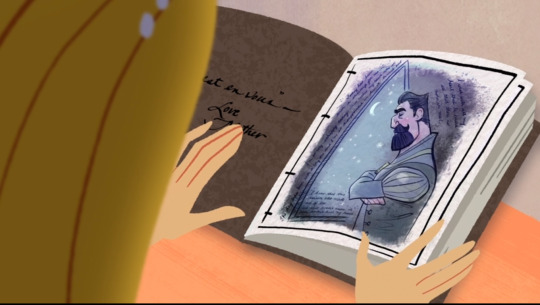
I keep calling Frederic the creator’s self-insert not because I’m making assumptions or accusations but because this is something that Chris has admitted to publicly on numerous occasions. If you want a reference than just check out his interview during D23.
https://www.youtube.com/watch?v=9ECeflBTS58
There’s also more confirmation on his twitter and in other interviews. Though I’d personally recommend that younger fans stay away from him and his twitter, given his past behavior. (more on this later)
Chris has also publicly made excuses whenever criticism of Frederic has reached him. The same excuses that he then puts into the show itself. That’s why he and the show is so desperate for Varian to be the hated villain instead and goes out of its way to create a bias in how characters and conflicts are presented.
Look, having a self-insert or a character you relate to isn’t in of itself a bad thing. Nor does having such a character mean that you personally avocate all that they do. I mean Varian is my favorite character in the show, partly because I’m a political activist, but that doesn’t mean that I approve of attacking government officials in their homes or something. Yet, if you want to make your self-insert likable to the audience then why on earth would make them an abusive dictator and then never hold them accountable to that?
I cannot say what goes through Chris’s mind nor what his actual beliefs are, but the very fact that show won’t acknowledge corruption for what it is and constantly excuses abusers is worrisome enough on its own. It either means that Chris is woefully incompetent, actually encourages authoritarian thought, or some combination of both. Add in his bullying of younger fans, to the point where his was kicked off the Tangled discord, and what is left is not a flattering picture of the man.
The Show Completely Assassinates Arianna’s Character Here
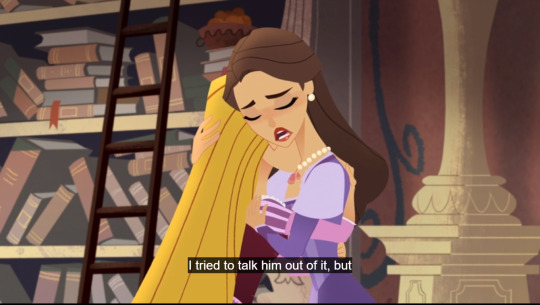

You’re telling me that the Queen has no power? You’re telling me that the only mother in the show is going to stand aside and do nothing while her only daughter, who has been missing for 18 years, is abused? You’re telling me that Arianna only exists in the story to excuse her husband’s actions? You’re telling me that this ‘strong, independent, badass’ woman you co-opted from the movie is only here to be subservient to a man and you’re going to act like this is a good and noble thing, that it’s ‘true love’? You’re telling me that if she’s not only willing to do this, right now, then she apparently has done it before in his 18 long years reign of terror and oppression?
Fuck whoever wrote this! This is an insulting to women everywhere and a slap in the face to people who were actually victims of abuse.
This is Enabling Abuse, Don’t Do This!

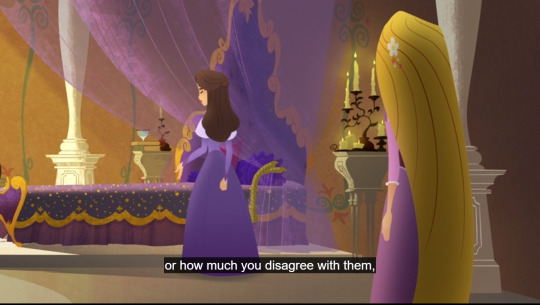
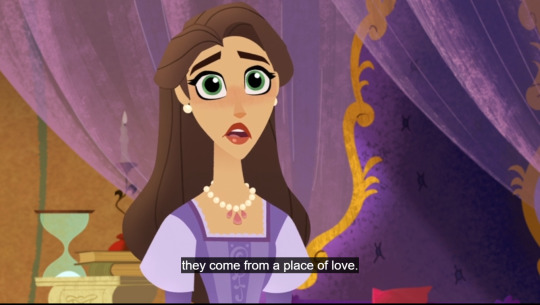
BULLSHIT!!!
This is the line abusers feed their victims all the damn time!!!
The movie smartly made the decision to keep Gothel’s personal feelings towards Rapunzel ambiguous. That’s why she is one of the best villains in Disney history. If we only look at the movie than she may have ‘loved’ Rapunzel too. Who knows? It doesn’t matter.
Abuse Is Abuse Regardless of the Abuser’s Reasons or Personal Feelings Towards Their Victim
Many abusers think that they love their victims. It’s a lie that they sell to both themselves and their victims. But it’s a twisted, toxic, and possessive ‘love’ that doesn’t actually care for and respect it’s recipient. Ergo, not love at all.
There’s not enough words to express my disgust with this exchange. There are children watching this. It’s directed right at them and sadly, yes, there are undoubtedly some watching who are trapped in abusive homes. The show just reinforced the beliefs of those abusers and helped to keep those children trapped in that situation by confirming what they’ve already been taught.
This is beyond irresponsible, and someone higher up should have stepped in before this. It’s clear that this show lacked any sort of real oversight. You have a million dollar series being showrunned by two newbie producers with zero writing credit and no one thought that there should maybe be a senior executive and editor involved?
That’s Not Enough

Admitting that something is wrong, right after excusing it, isn’t enough. You need to show the characters taking action and changing their ways. If Arianna truly believes that this ‘isn’t right’ then why does she not do anything about it after this conversation?
So What Did the King Do to Monty?

He runs off the tell the king the very thing that said king has gone to great lengths to hide and has yet to admit his involvement in. Also Monty doesn’t re-appear until after Varian blows Frederic’s cover. So what happened in between now and then? Did Frederic persecute Monty as well, lie to him, or did Monty not ever reach the King before the scandal was revealed, because any one of those answers would conflict with Monty’s actions later in the story.
Watch as Cass Forgets Her Motivation
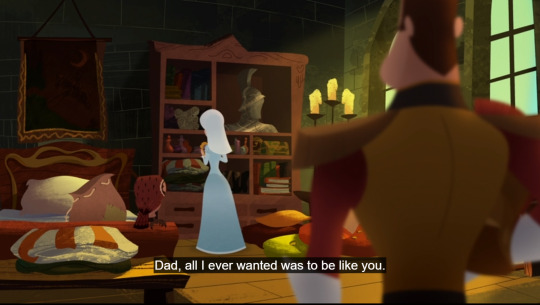
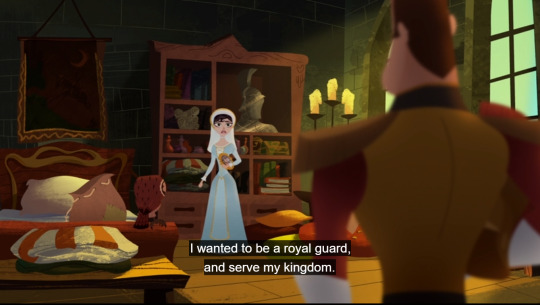
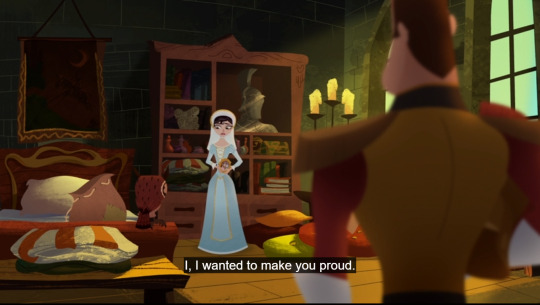
We’re at the end of the first season and the audience is only just now getting this important insight into the deuteragonist, a reveal that’ll only be walked back on in later seasons.
If Cassandra’s whole motivation and reasoning is just to earn her father’s approval, which she does gain by the way, then how come she gives a crap about what other people besides him thinks? If being a guard is her true goal then why is she after praise from strangers constantly? You don't get praise from being a guard. It’s a thankless job and she should know that from see what her dad has to do all the time to stay in Frederic’s good graces. Also why not make her dad more central to her arc and resolution, then?
What I’m getting at is that Cassandra isn’t consistent. What she wants changes conveniently to suit the story’s needs rather than being based in any actual logical progression of events. Often flip flopping from one supposed ill-defined goal to another and back again; till in the end she winds up with no goal at all.
Set Yourself Free is the Only Point Where Rapunzel’s Arc Works
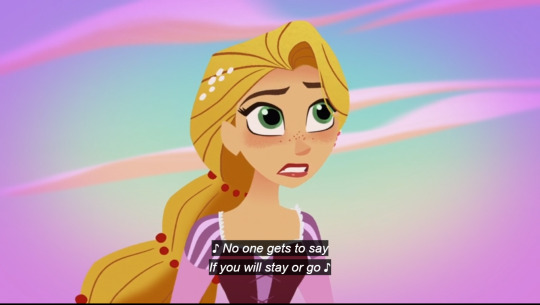
This is the only lesson that Rapunzel actually learns. How to be assertive. This is set up, is build up to throughout the season, and then culminates into this climax/reveal. For once there’s an actual resolution here to a previously established problem. A resolution that isn’t then walked back on. Rapunzel remains assertive throughout the narrative and grows no further past this point. There’s nothing else learned, even as she takes this lesson and runs it into the ground by overstepping her bounds and going into full on bully mode in later seasons.
Undermining Tension
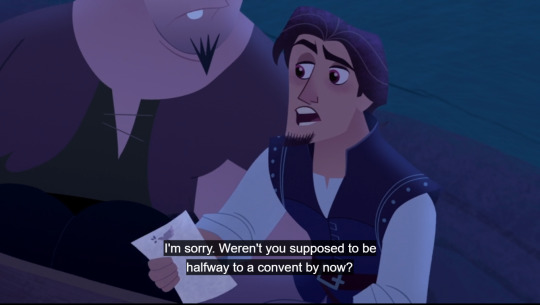

I talked about this in What the Hair, but Cassandra conveniently ignoring orders without consequence, or even any real effort on her part, showcases that the convent was never really all that much of a threat as it was built up to be. It goes from being a ‘threat to her safety’, a basic need, to a ‘threat to her sense of belonging’, a psychological need. One is less of an immediate threat to her physical being and ergo holds less tension.
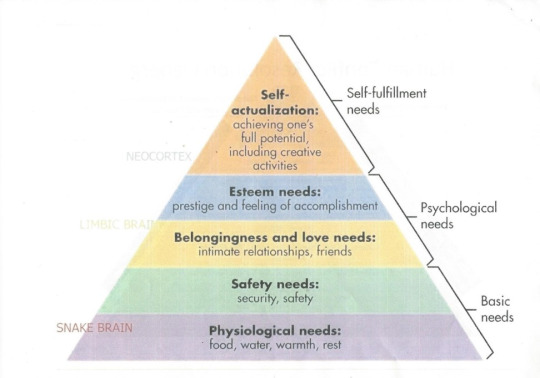
Even Hookfoot Admits He’s Useless to the Story
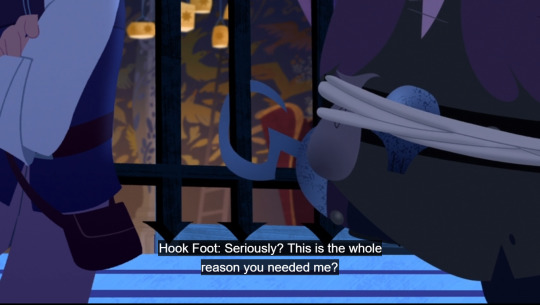
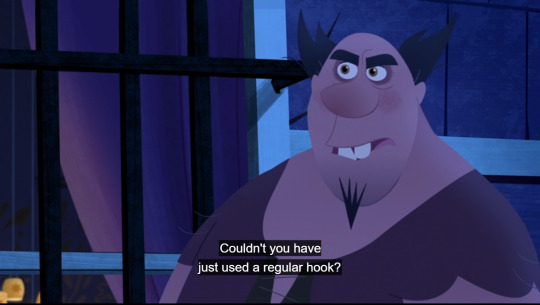
Look, pointing out the flaws in your story doesn’t make them any less of a flaw. I like Hoofoot, but he adds literally nothing to the series. There’s was no need to include him if you weren’t actually going to tie him to the plot. Just like Monty, Friedborg, Willow, and Axel; Hoofoot is a character who could have been exercised from the show and it wouldn’t have changed much of anything other than to give more screen time to the actual plot and main characters.
And for those who want to come at me for saying they should get rid of the tokenistic disabled rep, just remember there was no reason why Lance couldn’t have served both functions in the story. He could have been both disabled and black, while carrying all of Hookfoot’s episodes and being part of the ongoing plot. Much in the same way that Xavier and Monty should have been streamlined; combining both Lance and Hookfoot into one person would have left us with a more rounded character and a more focused show overall.
Varian Isn’t Lying Here

Look, just cause he’s the villain doesn’t mean he’s exaggerating the truth. Someone on tv tropes tried to claim that Varian was being unreasonable in accusing Frederic of ‘villfing’ him, but uh, no, that’s exactly what the king did. We got the on screen evidence for it back in Quest for Varain. It’s also true that he’s been keeping the rocks secret, lying to the populous, and has thereby endangered many of his citizens.
Cap is the Only Parent on this Show to Get Called Out, Recognize his Failings, and Actively Change His Ways....and the Show Still Messes this up by Having Cass Apologize to Him?

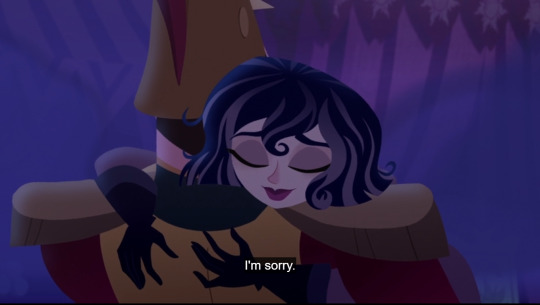
Cap is the best parent in the show, hands down, but that’s a very low bar to clear. What makes him the best parent is that he admits his faults and goes to great lengths to fix them. He never goes back or reverts to old ways and doesn’t offer excuses for his behavior.
But the show seems to think that you should forgive dad’s just because they’re dad’s, not because they’ve actually done anything to earn that forgiveness. That’s why Cass interrupting Cap’s apology to apologize herself doesn’t work here. She, and no other other child on this show, owes him (or any parent) such an apology and Chris can go stick a rusty nail up his butt for ever suggesting otherwise.
Oh, Look, Cassandra Getting What She Wants, Again

What is this? The fifth or sixth time now that Cass has been rewarded by the narrative? Gee, it’s almost like she doesn't really have anything to complain about in seasons two and three.
Varian isn’t Harming ‘Innocents’ Here
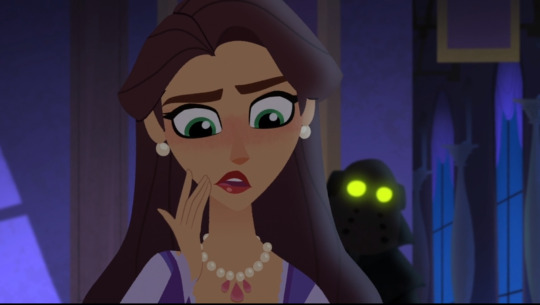
Remember when I said that Varian is both the victim and the villian? That’s reflected in who he actually attacks. Arianna, the guards, Cass, Eugene, ect. are all enablers for his abusers. They’ve knowingly chosen to side with a dictator who has repeatedly done unacceptable things. The guards and the main cast at least are very well aware of the truth. As to whether or not Arianna knew of the full details behind Varian’s treatment, she does know about Frederic’s past actions and has excused them for years.
That doesn’t make Varian treatment of her, or others like her, right, but Arianna isn’t blamess either.
If you’re a person with power who is attached to a system of government who goes on to uphold corruption, and remain silent in the face of that corruption, you become a part of the problem. You become the oppressor even if you’re not directly involved in the more violent events yourself or even personally hold the views of the person committing those violent acts.
A queen is responsible for a her people and she abandons that responsibility by staying with Frederic and supporting him.
Turning his Pet into a Mutant Monster is the Only Time Varian Hurts Someone Who Isn’t Involved
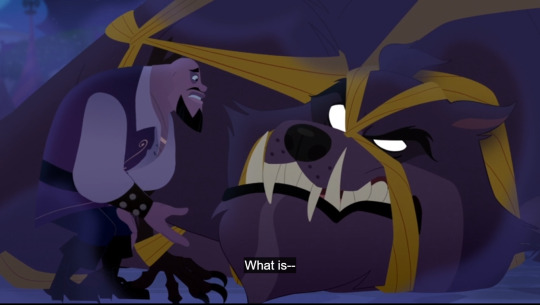
As I said, Varian is a villian. I’m not going to act like he doesn’t do bad things or that all of his actions are justifiable. The reason I’ve gone into great detail about Varian’s reasonings into what he does isn’t to excuse his actions; it’s to point out that ‘heroes’ are every bit as much to blame as he is.
Everyone is at fault here; not just Varian, not just the King, not just Rapunzel ect. But the show forces Varian to carry all of the blame regardless. Which is why the show fails. You can’t set up a morally complex situation like this and not follow through on it completely. Failing to do so winds up reflecting poorly upon the writers and those that try to excuse them.
Conclusion
Dang, this took forever. This is why I’m following Disney’s lead and splitting the review into two parts. Come back tomorrow, where hopefully part two will be up.
#Varian#tangled#anti-tangled#anti-rapunzel#tangled the series#rapunzel's tangled adventure#king frederic#queen arianna#cassandra
199 notes
·
View notes
Text
List of Reincarnated into the Villainess of an Otome/Romance Novel Series I Like
Soooooo I’ve gotten sucked into the very specific isekai subgenre?trope? Of girl gets reincarnated into an otome game or romance novel she loves but is the villainess. It’s kind funny how similar these all are but at the same time so different. Now these arent all the titles just the ones I’ve read for at least a volume and like. (if asked i might make a list of the ones that failed for me). I’m gonna separate by types. and if you know of any other titles please do tell me.
Received Past Memories during Childhood
(The story starts with the MC remembering her past life as a child and growing up with the knowledge)
I Reincarnated into an Otome Game as a Villainess With Only Destruction Flags...
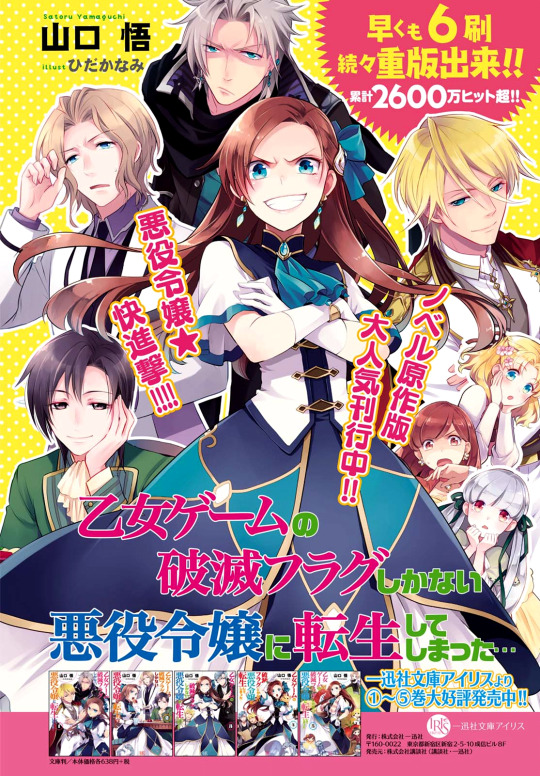
So this one has a good deal of traction since it has an anime adaption currently running, but I’ll be honest it’s not one of favs. This series is primarily a harem comedy and most of the jokes deal with the MC’s expectations from the game not matching her new reality and not realizing why, which can be very fun, if one note. The characters are likeable which is why I keep reading but I think some other titles on this list use the concept far better. There is also a spin off version where the MC doesnt get her old memories until later in life and has to deal with the actions of the game character, but it’s fairly the same you arent missing much if you dont read it.
The Villainess Want to Marry a Commoner

So in this one the MC isn’t trying to avoid a bad end rather she’s very excited to be able to romance her favorite NPC whom she wished was romance-able. (which honestly mood) I’m not very far in but it really takes the whole this is a game the furthest as there are stat checks and the MC basically carried over all the items and skills acquired in her past playthroughs.
Survive as the Hero’s Wife
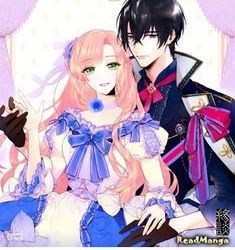
A web series, this one takes place in a book and the main pair are married as children and the MC plays double agent for the series antagonist to keep her and the LI safe. It’s fairly involved with a larger cast of characters but I’ll be honest this is one of the titles I feel would be stronger if it was just a straight fantasy series, the whole Isekai aspect feels like it’s there just to make the plot move quicker. But all around a good read.
Fiancée’s Observation Log of the Self-proclaimed Villainess
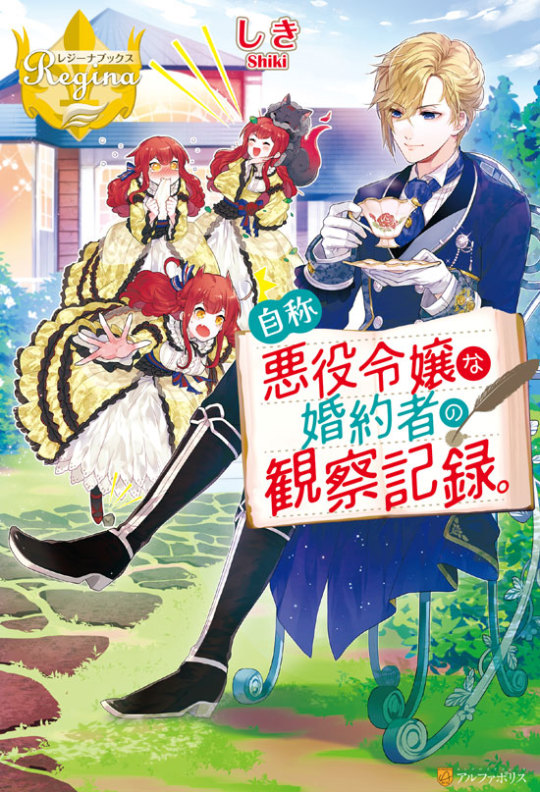
Now this one has a fun twist on the formula in that it’s told from the perspective of the love interest. Some of the faults other titles are plague with are avoided here as the main character himself has no knowledge of the world being a game, his fiance does but while she’s happy to tell him she’ll be a great villainess and get him a happy ending with the heroine she never tells him why thats so important so he’s left in the dark and thereby so are we. I will give a warning there is bit of fat shaming in this as the original games villainous was chubby but this version is skinny, like its not awful but its not the best implication that bad is chubby and good is skinny.
The Evil Lady's Hero
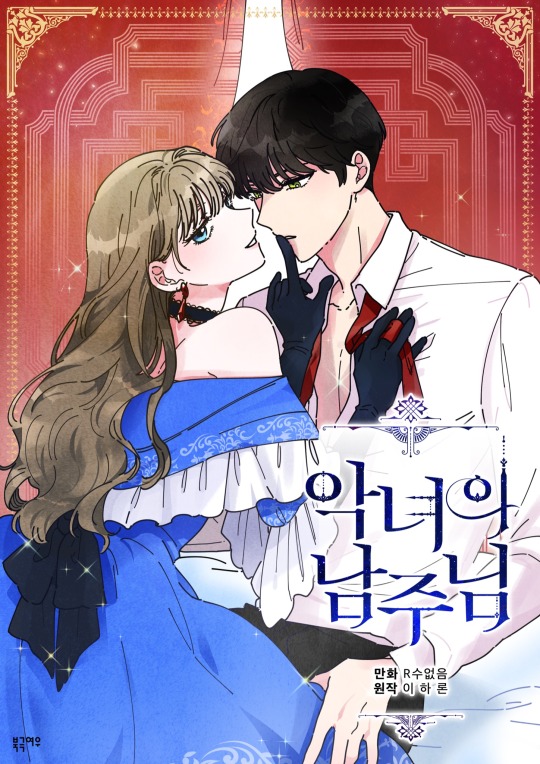
Another webseries set in a novel while we dont see the MC in childhood (save for some flashbacks) it’s stated she’s had her old memories since then. What I really like about this series is the MC’s personality and set up. So she died well into her 20s and as such she is a bit more mature and levelheaded than most MC’s, her plan was to avoid the main cast of the books as much as possible but ends up drunkenly sleeping with the male lead leading to them dating. Her thought being I’ll just enjoy this for now and let him break up with me when he meets the heroine, all good. The pair play well off each other and I’m curious to see where the story goes.
The Result of Being Reincarnated is Having a Master-Servant Relationship with the Yandere Love Interest
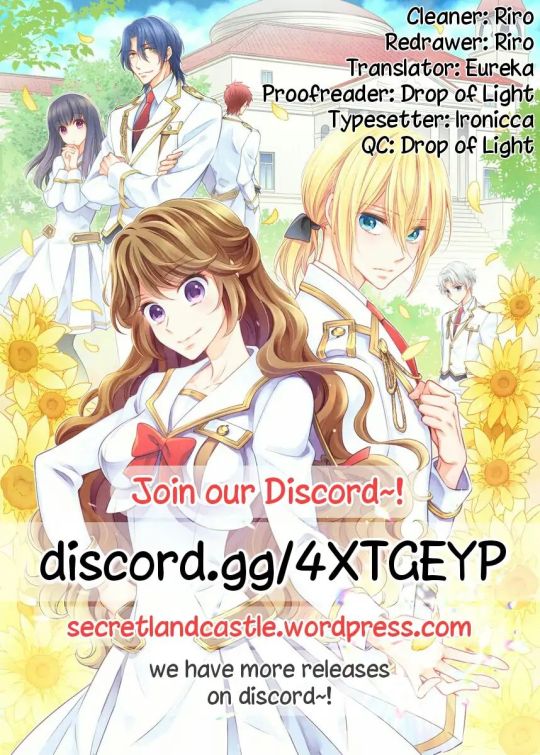
Now this one has a lot of fun with this concept as there are two other characters who were reincarnated like the MC. Because this game had only yandere love interests even the “good” endings arent that good, the MC also has limited knowledge as she didnt get to play all the way through so she feels less omnipotent than other protagonists, and along with not being the only person displaced it gives the series a nice refreshing feel.
Received Past Memories as Young Adult (The story starts with the MC remembering her past life after/during the events of the game/book)
I’m a Villainous Daughter, so I’m going to keep the Last Boss
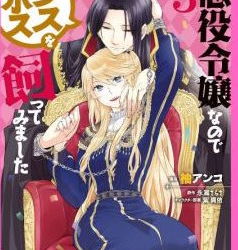
So I actually really love this series and wanna read the light novel version. The MC regains her memories during the beginning of the bad end for the villainess and thinking quickly saves face to run off and find the main antagonist of the game the demon king who happens to be a secret route on the second play through. Its a very fun read but gets a little dark in later chapters I wont spoil cause its good but there is an attempted rape scene.
Simply Good Sense for a Duke’s Daughter
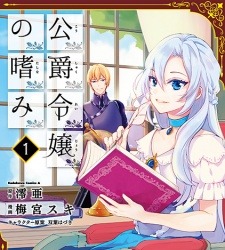
This one kills me cause the world building and characters are so strong and dense it’s actually weakened by the fact that the MC was reincarnated is really just kinda brushed off most the time. As you get more and more invested the only real purpose her being reincarnated into an otome has is like some ideas for products to sell and how to make things that dont exist in this world yet. Like I wont say I don’t enjoy it but I think I’d enjoy it more if it was just a fantasy story.
Beware the Villainess
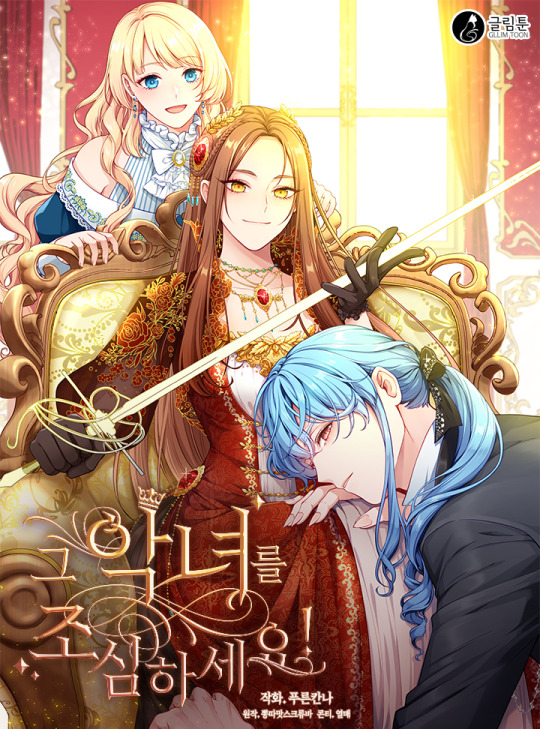
God I love this webseries. The MC is just a delight as she decides she wont be evil but she wont be good either. What I like about this series is it kinda plays with the fact that the setting is a trashy romance novel cause as the MC learns more about the main characters of the novel she finds that the descriptions in the book dont match up because it’s very surface level. Example a merchant whos said to be very smart and savvy in the books is actually rather easy to outsmart, MC realizes it’s cause the writer only ever wrote he was smart never HOW he was smart. I would def give this one a read its a lot of fun.
For Certain Reasons, The Villainess Noble Lady Will Live Her Post-Engagement Annulment Life Freely
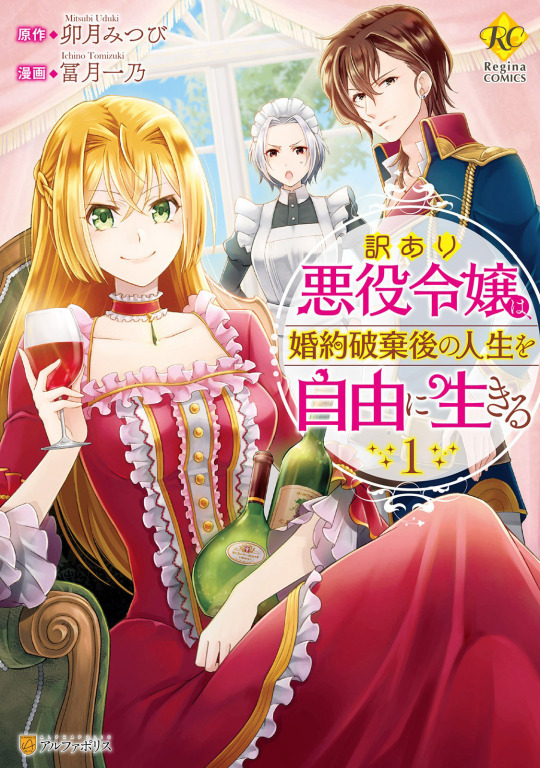
This is again another series I think would be stronger if it was straight fantasy. The MC of this story actually has no idea the world is an otome game, she was nurse in her past life and uses that knowledge for the betterment of the land, (though actually its hard to tell if she was really reincarnated or just has the memories of this person) The story could have moved just as well if the MC was given like a medical textbook from a mysterious other world. But the characters are fun so its not awful just not one of my favorites.
Reincarnated but not as Villainess
I Am Troubled That My Fiance Is a Villain
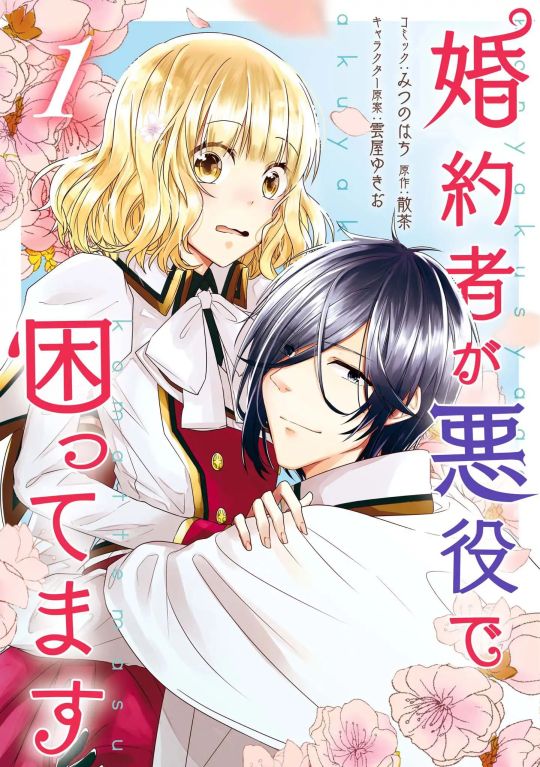
The MC is reincarnated into an otome game with her memories as a child but as a side character, she ends up endearing herself and becoming engaged to the games villain character. Its very cute because she doesnt have to worry about a bad end she doesnt try to interfere much just keep those around her safe.
Seduce The Villain's Father
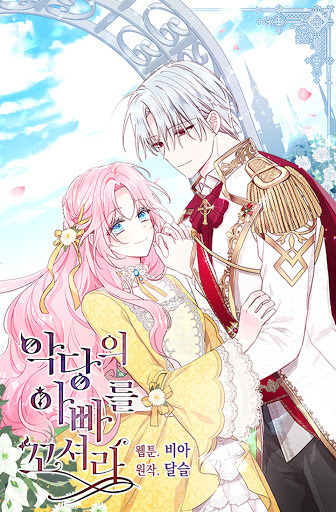
Web series MC gets reincarnated into a novel as a minor character, as the story takes place prior to the events of the book she changes things to keep her new sister safe and uses the opportunity to try and avoid more tragic events. Its not bad I’d say the idea itself is interesting though its a little uncomfortable she calls the male lead “father”
A Villain Is A Good Match For A Tyrant
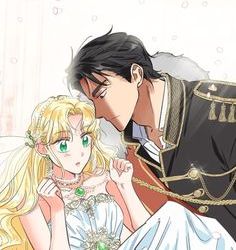
Ok so this web series is kinda hilarious and I do have to spoil a little cause the person reincarnated is NOT our lead, its our villain. So this person was actually the author of the story, she had written a novel about a girl being reincarnated into the bastard daughter of a lord who gets engaged to a tyrant and has to pretend to be evil to stay safe from his enemies, and the author is so PISSED she reincarnated into a random priestess. Its so weirdly meta. The MC is the lord’s bastards and the events play out just like story only she doesnt get her body taken over. This series is very fun, cant wait to see how it goes.
Anyway this is my list if you have suggestions for me I’ll check them out. Will probably make another list later.
#manga#web series#isekai#I Reincarnated into an Otome Game as a Villainess With Only Destruction Flags#The Villainess Want to Marry a Commoner#Fiancée’s Observation Log of the Self-proclaimed Villainess#Survive as the Hero’s Wife#The Evil Lady's Hero#The Result of Being Reincarnated is Having a Master-Servant Relationship with the Yandere Love Interest#I’m a Villainous Daughter so I’m going to keep the Last Boss#Simply Good Sense for a Duke’s Daughter#Beware the Villainess#For Certain Reasons The Villainess Noble Lady Will Live Her Post-Engagement Annulment Life Freely#I Am Troubled That My Fiance Is a Villain#A Villain Is A Good Match For A Tyrant
54 notes
·
View notes
Text
Honestly, South Park is a really good show. Anyone who calls it racist today, fundamentally misunderstood why it makes of fun of busybodies, as well as why remaining chilled, calm and cool is actually a good thing. People complain a lot that South Park is a show where uncaring is cool, and where people who care too much are the butts of jokes. Now, I never want to do this- I don’t want to deny someone else their perspective- But these opinions are built on shaky premises, and misses the mark. First lets start with Eric Cartman, who is recognized as the source of a lot of the bigotted comedy in the show. Eric Cartman, ever since the first season, had almost always been put in the role of an antagonist/ that one drama queen who no one wants to get involved with. He finds ways to manipulate situations if it’ll mean he’ll receive something out of it, and is a self-centered person to the extreme. When he says bigotted things, we’re supposed to find him disagreeable and hateful, and his being funny will never make what he says to be okay. We’re also supposed to feel refreshened whenever Stan and Kyle immediately admonish him for being a dick, which is also funny, because holy shit, not only do we have a child spouting antisemitic bullshit, but we have children who will actively tell their peer to fuck off! Its wonderous. This is WHY South Park was so fascinating to begin with; Before South Park, there was never a seriously funny depiction of kids using realistic adult profanity while having childlike discussions on topics that were considered political. Now lets move onto Stan and Kyle: These two are clearly shown to be awesome and cool kids who just want to have fun and enjoy their lives. They don’t want to be roped into things that adults tell them that they’re supposed to be worried about. They’re kids, they live in the present. They live uncomplicated lives, as any 8-year old should, unless its something they’re interested in, like an adventure involving other kids from their class (anyone remember them capturing a paper fortune teller from the girls?). They don’t force themselves to care about things. They understand from a young age that ungenuine about causes can be harmful, and a waste of time and energy.
When they DO genuinely care about things, we have cool and rich plots emerge that are related to our understanding of them as characters- Stan has successfully helped save the lives of veal up for slaughter, as well as whales. Kyle navigates his Jewish faith and identity while being one of the most compassionate human beings on television. Even better than that, these boys arent’ even particularily strongly identified. Stan isn’t that “animal rights activist”, and Kyle isn’t that “humanitarian child”, they’re flexible and dimensional characters. They have their moments where they’re just being kids and are relaxing and having fun like normal, as opposed to brooding over shit that they can’t control. It seemed like South Park had an accurate depiction of what a healthy attachment to identity/cause actually looked like, WAY beyond this era of neuroticism where people are encouraged box themselves.
It says a lot of sad things about children nowadays, too. Children in the current generation are pushed harder than in prior generations in being perfect students, with mandatory volunteer work pushed onto them and being told that they need to develop their life’s passion in time for college plans. Some of them get pushed into becoming esports stars or child Youtubers by their parents. When do they even have the chance to be children anymore?
Now, onto the adults of the show: The adults are always screwing things up. They want to ride on causes that they aren’t truly aware of.
They are their own society’s disruptors; They often neglect to critically examine whether their call for action and change are justified. They don’t check to see whether their actions are necessary, or if their methods are reasonable. Sometimes, their actions create more damage than if they didn’t do anything at all! And this is why we mock them- Not “for caring”, but because they’re busy bodies; Their motivation to act or call for change comes less from wanting to affect meaningful change within their society, and comes more out of a vague desire to want to “better themselves”.
Its the type of selfishness that we don’t really speak enough about in our current society as we should be- How people get intertwined into causes they aren’t truly thoughtful enough about, because they’re just encouraged to get passionate about “anything” that moves them, or “anything that seems worthwhile”.
And this is both stupid, as well as dangerous, because you want people to be mindful about what the real affect of their “help” is. Some things that people do in the name of “help” either don’t help the people it’s intended to help (the only poor family in South Park, the Mc Cormicks, get a single can of vegetables on Thanksgiving via a gameshow-like contraption, and they don’t even get a can-opener for it), or make matters worse for those it claims to help (Like Bono claiming that Timmy playing in a band was akin to mocking his disability). People can, and should be encouraged to help make a difference, but you don’t want a culture where you keep pushing people to change things for the vague reasoning of “being a good person”. You want people who are informed, aware, are capable of critical thinking, and who can tell when and where their efforts are actually needed.
Also, this is extremely important: But South Park is, like literally everything ever, a product of it’s time. This show was made during the 1990′s to early or late 2000′s, when things like media activist groups existed to police and censor stuff for people because of those things being deemed “insensitive”. This was before the internet was fully used on the scale it is today, so people were being limited from being able to watch/read/play or otherwise access media based purely on stupid, petty shitty reasons.
Like not allowing children to enjoy Canadian television because farting or using cusswords is “too offensive”, where you were dealing with Karens who had way too much power and time to spend. It meant telling Karens/Boomers relax and not to deprive other people of their ability to express themselves just because they didn’t think their interests were “appropriate”. Totally a different thing than when we talk about the generalized concept of sensitivity today, when we’re refering to how human beings are made to feel as based on their identity.
Kyle’s lectures at the end of an episode are meaningful- It doesn’t exist to “undo” any offensiveness in an episode. He’s a voice of reason who brings together the social commentary. I don’t see why anyone would ever have a problem with it. Is it obvious and easy? Yes. Does it put a nice cap on the end of an episode to return everything to status quo in time for the next one? Yes. I loved it. I thought it made for a comfortable, easy viewing experience. It may be considered formulaic, but thats how they made the end of an otherwise edgy episode feel wholesome, or depart a message of value.
Its easy to see this as an “attack on caring”, if you’re applying it directly to today’s movements and stuff, but that requires a lot of willful ignorance, and an even greater lack of understanding the context the show was made in. We all have access to wikipedia, no one has an excuse.
TL;DR, it didn’t “age badly”. It was extremely relevant for its time. Context matters, and this show was perfect for the context of it’s time. The creators are doing their best to address current modern day topics with new story-telling, so maybe look to the present and be amazed by how much they’ve decided to change in those regards instead of repeatedly making everyone who grew up with the show feel old. Sincerely, a nonbinary pansexual liberal woman of color who just wants to enjoy South Park as the greatest still-running animated satire ever, thank you
11 notes
·
View notes
Text
Handle With Care - Post Mortem
When I first started writing Handle with Care, it was going to be 100 chapters long and there were a few key differences in the plot. These changes occurred generally slowly as I gained a better understanding of my world and characters, while some shifted dramatically due to my feeling they were thematically inappropriate for the story I wanted to tell. So with the conclusion of the main fic and its various continuations, I decided to detail a little more in how I approached a 100 word daily drabble fic, and why certain events occurred or why certain characters played certain roles. This post is mostly for the folks out there who like all the nitpicky background information that goes around in the author’s head while writing.
100 WORDS A DAY
In choosing to write 100 words a day, I gave myself both a goal and a challenge. 100 words is often little more than a paragraph. Maybe two. I often found myself writing on my commute into work or during lunch on my phone, because while 1000 might feel overwhelming, 100 is not. Right? Yet some days I found just enough time to type up 100 words between work and other commitments (October was interesting, since I did Inktober and well as Promptober, on top of my usual working schedule). But the most challenging part was not writing 100 words. Writing 100 words was easy. Writing ONLY 100 words was where things became tricky.
In my original intentions for this fic, scenes were not supposed to span over multiple chapters. Each drabble was to be a self contained snapshot of time. But as the story became more emotionally centered, I shifted away from that idea and focused more on making each drabble exist as a chapter. Chapters can have cliffhangers. But they need to communicate a thought. An idea. A feeling. With 100 words a day, my objective became: Progress the story in a meaningful way or communicate some important information to the audience. With 100 words, there was often little room for getting lost in details.
Now one my ask again, why 100?
100 is the number of words in the definition of a drabble. 100, again, is an easy minimum to reach. But when you are used to writing 2-3k word chapters, flexibility is minimal and you have to decide what needs to be said, and what you were saying to fill space. And I found it a wonderful learning experience and valuable exercise as a writer. I’ve attempted to start drabble fics in the past, but rarely did they ever get past a couple chapters before I would get frustrated by the limitations. Because let’s be honest. Writing a 25,000 word story, 100 words at a time, is a test of one’s patience as much as anything else.
THE STORY
Handle with Care was originally supposed to be pure romantic comedy with just a splash of darker undertones in the background for color. But as much as I love fluffy comedies, as I wrote, there were conflicts that I didn’t feel should be glossed over. As some of my long term readers and commenters will know, I’m terribly fond of bitter with my sweet. Angst with my fluff. The bad things in life make the good all the brighter. And conflict drives a story forward.
So what changed?
There were many different variations on how Sans ended up raising Papyrus alone. Some took our overbearing science dad, Gaster, and outright cast him in the role of a villain as opposed to a mid story antagonist. Straight into, why aren’t you in jail, territory. Others barely featured Gaster at all, as he was disconnected from Sans after his son didn’t end up pursuing a ‘productive’ career in the sciences. There were even a couple considered drafts where Papyrus and Edge did have another parent and the reason Sans was distrusting and cagey was because of a broken Soulbond. (And for those of you who were Web/Sans theorists, well, there was a version where you weren’t wrong! Sans started an affair off with Web after the LOADs began as a sort of ‘regain control of his life’ thing.)
What may interest folks is that the story was originally not supposed to end with a wedding and a house in the planning. The happy ending was going to be less sugar and more height of the moment drama. Around the time Frisk intimidates Red into silence, she was going to instead start him on the path to discovering answers. No confessions from Sans. No journals. Instead Red goes on the hunt for clues and gets fragments of the story from different people, especially Gaster and Frisk. It was all quite emotional, but the pacing felt off, and I felt it would be more rewarding if Sans grew as a character and he was the one to confess all his secrets.
Another altered thread was Red being only Web’s son. Early, early on, Red was the product of Web and some other monster. I even considered that monster having died in birth with Edge. But I scrapped that quickly, and decided that instead, Edge was Pap’s twin, and that the grim mood Web was in, was because of what he saw as well as what he remembered from past timelines. He almost watched his friend and coworker dust in his arms. Properly traumatic, eh?
There is a completely cut scene that I may write in the spin off that goes more into detail about Red’s similarities to Gaster, and Sans’ to Web, and how people often choose partners that are like their parental figures. You may ask. Wait. What do you mean? Well, Webdings didn’t smoke. He drank. Red, despite having dabbled with the stuff, is never shown to drink recreationally or get drunk in the fic, for more reasons than being underage to do so. However, it is very lightly implied that Sans’ coping method of choice is alcohol, though Red quickly quashes this habit after the drunkenness incident. Now, who else smokes? Gaster. Sans doesn’t like that Red smokes (for obvious reasons it reminds him of his father and Red does try to quit in the fic, though ends up falling back on it when stressed.) There are other similarities if you look close. It’s one of the reasons that Gaster and Red don’t get along. They’re both strong personalities, and can be pretty quick to pass judgement on someone.
THE CHARACTERS
As many folks picked up on, Handle with Care, has multiple meanings. It is a moving pun based on the CAUTION: FRAGILE | Handle with Care, labels on the sides of some boxes. It is also one of the main themes of the fic itself. Everyone in the story is a person with their own pasts and pains, which makes them fragile in different ways. And some of them even represent different types of relationships and people we encounter in our lives.
Red - Our protagonist. He’s a young man picking up the pieces of his life after his father’s apparent suicide, left to raise his baby brother when he was only sixteen. He’s the child of an alcoholic and forced to take on an adult role too young. As a result, he has a few unhealthy coping mechanisms, struggles with his temper and his sense of self worth. But he’s the one that got out. That put his life on the straight-and-narrow.
Sans - The love interest. Grew up young from the sheer expectations in his life. He was never without, but when the LOADs happened, he cracked under a lifetime’s worth of pressure. He broke down. Stopped trusting anyone, including himself. And very likely only kept himself from Falling because of Papyrus. Much of his struggles is based on the single mothers who would say that their child is what saved them or got them through those darkest time by just existing. He is also the individual who was groomed for success that ended up with absoluting no proper coping skills because of his rigid upbringing.
Papyrus - The optimist. He stays positive through everything. Everything and everyone can do better, and he sees the best in all situations. But he also has a responsible streak with an urge to organize everything (clean/cook/no desserts before dinner). His relationship with Sans could have very well ended up problematic, with Paps taking on a parental role for his parent early on in his life.
Edge - The pessimist. Edge is the other side of the coin from Papyrus. While his world view is often just as rigid, he is emotional. While it is implied he was always a fussy baby, he’s very sensitive to change, and shows that children are capable of picking up on things that the adults in their lives try to hide. His abandonment issues run deep, and will cause him to lash out until he is older and learns better self control and comes to terms with his father’s death. It is not uncommon for children of single parent homes to become resentful, if not at their present parent, but at the one that is gone. It is difficult for Edge to separate his father’s death, and Red’s fights with Sans, away from himself, and his self-centric view of the world.
Gaster - The (sympathetic?) antagonist. There are points where you love to hate him, and other times, you have to step back. He’s the authoritarian parent that dictated most of his child’s life up until that child literally vanished and became a hermit for a while. It isn’t through callousness or unkindness that he acts this way, but in what he believes is the opposite. He struggles with emotions, especially showing them, an example of how often older generations, especially males, often don’t/can’t/won’t show emotional vulnerability. He wants the best for Sans and those he cares about, even if he often fails to show it properly.
Web - The dead dad. Red’s relationship with Web is complicated. He remembers when Web was a brilliant man, even if not the most fatherly of fathers. But he also laid witness to his fall from grace as well, his drinking habit the most evident. His role is ambiguous much of the story, though he’s left behind hole. His death is the catalyst to a number of the story’s events, and Red’s struggle with him in death is to show the complicated feelings people may have when they lose a loved one who may have not been the best person. Sans’ relationship with him was more to highlight how far he’d actually fallen in the end from where he used to be.
Toriel - The mother. She is a maternal presence in many character’s lives. Her mothering is revealed to be related to her inability to conceive a child. Infertility is a common problem for women. She goes on to foster, babysit and even adopt after Asriel is born. She also an example of the powerful bonds we form with others and how sometimes families are found. Toriel was as much of a mother to Sans as she was Asriel.
The Fallen Humans - The catalyst. If Frisk didn’t exist, there wouldn’t be a story. After all, she was the child that climbed the mountain, starting the events of Undertale. Frisk and Chara both are implied to have troubled pasts, which lead them to being vulnerable to that idea of absolute power corrupts absolutely. The meddle. They are often selfish and don’t consider the consequences of their actions, and when they do, there is a sense of it doesn’t matter. Nothing matters when you can manipulate reality itself. But where Frisk possess a sense of guilt for what happened with Sans, Chara does not, and even outright tells Red that he is willing to do anything to accomplish his goals (even if that means hurting everyone else). Kris is a ‘dreamer’, and while he has more control over tweaking the events that play out, he is far less calloused by RESETS and LOADS. He just wants to be close to his brother Asriel, as well as help his ‘siblings’ find a sense of belonging.
Undyne - The Protagonist’s parallel. A child of divorce, which for monsters often leads to trauma and death, she is left to be raised by Gerson. She’s angry, resentful and prone to get in fights. Red often compares her to Edge, but can also empathise deeply with her troubles. At fourteen she is old enough to understand the reality of the situation, but also young enough to be deeply affected by the changes. Given the rarity of divorce, it is implied that her home life was unstable before the events of the story. Red tries to help her as he never got help himself.
Asriel - The miracle child. Mostly a background character. Asriel’s main connections are to Kris and the Dreemurs. He was the child that a couple struggling with fertility finally conceived. His being born, however, resulted Gaster creating Red for Webdings.
Asgore - The powerful person. Gaster and Toriel both have names that are impactful in the community, but Asgore is the founder of Dreemur Medical and Biotech. He was the King of Monsters. Despite his passive role, he influences many of the character’s choices and actions but simply EXISTING as a person of importance. Gaster tries to literally create viable monster cloning/fertility enhancement methods for him which lead to Sans and Red being born. His inviting Web to work with determination led to the creation of the Machine.
Gerson - The substitute parent. His main role in the story is as a family friend of Undyne’s and in the end, her new parental figure. She resents him and he takes care of her. He cannot replace what she’s lost, but he tries to provide her a future. A hard role to fill in a child’s life.
Grillby - The old friend. Grillby plays are far more subtle part. He’s survived a broken Soulbond, he’s friends with Sans, and through every up-and-down, he’s remained open to Sans when he comes back around. Sometimes as children we form friendships with adults that are just as strong as those we form with our peers. This is true for Sans.
There are a few more characters that show up mostly for color and world building but don’t play a significant part in pushing the themes of the story.
CONCLUSION
Would I do this again? Yes. I am planning on continuing the 100 word trend in the Pre-Sequel This Way Up. It may be truer to the spirit of drabbles since we will have a lot more ground to cover since it will be telling Sans’ history. We’ll get to learn more about Gaster, Webdings, the Dreemurs, Grillby and the Fallen Humans. And for those of you who want to know more about the HwC boys as they are? Moving Day will fill in the blanks. And I also promised a sequel. Bubblewrap Blues will take place significantly in the future and center around a certain aptly named skeleton and the edgy boy that likes to get coffee in his cafe.
I’m pleased with how the story turned out.
I never expected the reaction and the feedback. To those of you who commented and kudosed. Thank you. And to those who quite literally followed me from the start, reading and commenting near every day if not every day? You’re extra amazing. Thank you. Thank you so much.
#Handle with care#Undertale#fanfic#post mortem#kustard#textpost#babybones#daily drabble#100 word drabbles#personal challenge#finished#finished fanfic
15 notes
·
View notes
Text
211. Sonic the Hedgehog #143
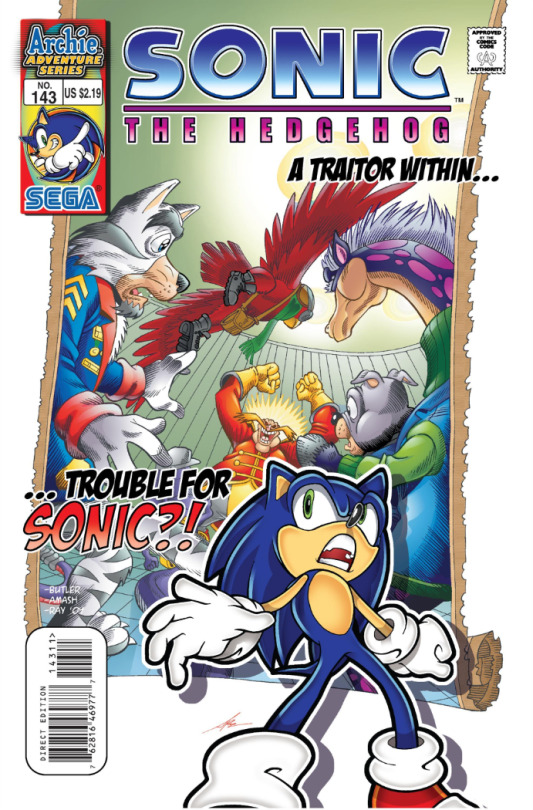
The Original Freedom Fighters (Part 2)
Writer: Romy Chacon Pencils: Art Mawhinney Colors: J&A Ray
So it's time to find out just how the original Freedom Fighters were betrayed and lost. The guard at the Lake of Rings catches a ring and then lets Sonic and Hope watch the place for a bit while he delivers it to the castle, and Hope urges Sonic to continue his story, which he agrees to on the condition that afterward she'll let him go off to do his thing. One day when Sally was still young, Stripe was speaking with her and being kind when Peckers, who has the worst name by the way, burst in with some news.
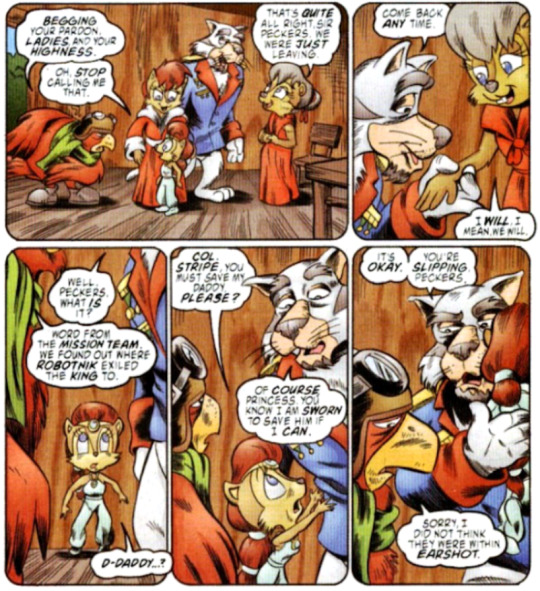
That's right, they found out about the Zone of Silence years before the current Freedom Fighters did. They went into the palace on a mission to rescue the king, or at least to gather more information for a future rescue, but suddenly found themselves trapped within a room, with Scales leering at them from the outside and Robotnik stepping up beside him. Scales had apparently betrayed his teammates because he wanted power and also because it was "totally within his nature" as a snake, but true to form, Robotnik had some treachery of his own to enact, throwing a horrified Scales in with his fellows. Robotnik revealed to them that they were standing in his first room-sized roboticizer, before pulling the lever.
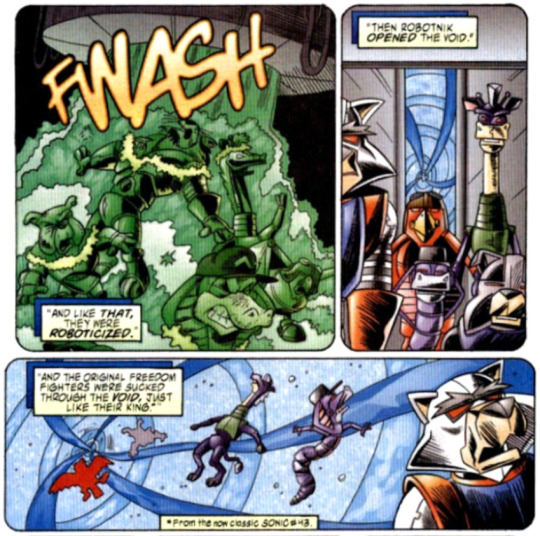
Oof. Uncle Chuck, still roboticized, saw the whole thing and had it recorded in his memory banks for posterity, but those in Knothole never found out what happened until years later when he regained his memory. All they knew was that their heroes had disappeared, and held funerals for them all befitting their status as heroes. The young Sonic was stunned and demoralized, as Stripe in particular had always been kind and encouraging to him, but ultimately the actions of the original Freedom Fighters were what inspired Sonic, Sally, and the others to form their own group and carry on the fight.
Now remember how I said this ties into something I've brought up before? I've talked many times about how the war against Robotnik has essentially been carried on the backs of literal child soldiers, but we've never really discussed why this came to be. Well, here it is. This is why. Remember that Robotnik's takeover came right on the heels of the Great War, with barely a few years at most separating the two wars. From Robotnik's perspective, he couldn't have picked a better time to stage a coup - the kingdom was weakened, and a lot of its best fighters had likely died or had to retire permanently due to injures from the previous war. Not to mention that a lot of people who could have helped in the current war were likely captured and roboticized in the initial fight before they had time to react - Robotnik would have known who posed the greatest threat to his rule and made sure the swatbots targeted them, and in addition, it's implied in the previous issue that Stripe was one of the only veterans who had the sense to run away rather than stand and fight. The original Freedom Fighters were basically all Knothole had left. And when they were lost, Knothole was vulnerable. Hope was in short supply. Hardly anyone had the ability or the mental fortitude to even try to carry on the fight.
And then this little band of orphaned kids rallied around the precocious princess, and took inspiration from those who had fought before them. These kids, most of whom were barely older than eight (and I'm not guessing at that number, it's literally confirmed later on in the comic that Sonic started striking back against Robotnik at the age of eight), banded together with the overconfidence of young children and put themselves in harm's way to save the planet. They grew up so surrounded by war that participating in it was second nature to them, and though each of them were hit with their own unique traumas from the things they'd seen and experienced, they kept up the fight, into their teens and into now. And like I've pointed out before, even now that many of the kingdom's adults are freed and willing to continue the fight for them, they refuse to give it up. Sure, Sally may be preoccupied with being active ruler right now, and maybe Rotor has retired from field duty to work on inventions back home, but everyone is still wholly invested in the fight despite their still-young ages. And that's both inspiring, and utterly tragic - especially considering that most of them aren't even self-aware enough to understand how awful throwing children into a war is. They just don't know anything different.
But anyway, as Sonic's story winds down, Hope thanks him and then rushes off, remembering her homework assignment for history and leaving an exasperated Sonic to guard the pool alone after all. The next day, she has her report all finished, and recites it in front of her class to much praise.
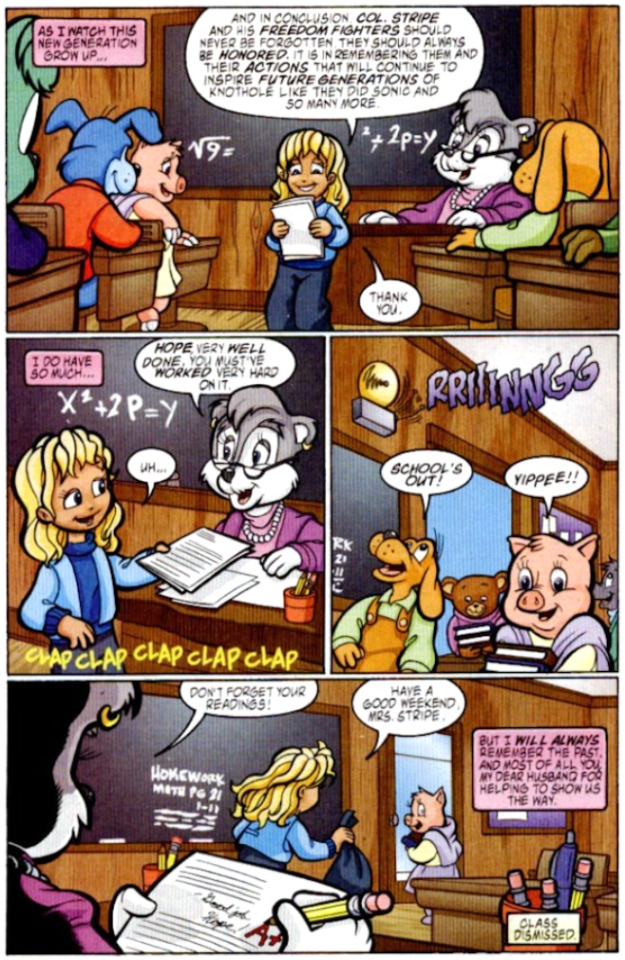
That is a great way to tie everything together, if you ask me. I'm sure it makes Mrs. Stripe and everyone else who personally knew the original Freedom Fighters happy to see the youth of today, even the youth of another species entirely, remember the sacrifice of those heroes.
Mobius 25 Years Later: Father's Day
Writer/Pencils: Ken Penders Colors: Jason Jensen
Are you ready, kids?! This is actually the best installment of this arc, period! It's relevant to the current conflict, it contains important character development, and a satisfying conclusion is reached by the end! I know, I know, I'm shocked as well. But my praise for this chapter is genuine, and you'll see why.
Lara-Su comes downstairs in the morning, wondering where her father is. It's hard to tell if this takes place shortly after her discussion with Knuckles last issue, or if this is the next day entirely or something, but either way, Julie-Su reminds her daughter of what day it is, which - well, I hardly have to tell you, it's right there in the title. It seems that on Father's Day every year, Knuckles visits the grave of Locke in the forest - it's been hinted at here and there that he's dead by the time of this arc, but this is our first clear confirmation of the fact. Knuckles drifts into memories, first of a conversation he'd had with Archimedes many years ago. They'd traveled to the crater in Downunda where Angel Island first lifted off after having spent several weeks together, and prepared to part ways, as Archimedes was planning to move here to Downunda permanently. Knuckles was somewhat baffled by his decision, having deep roots on Angel Island and being unable to relate to wanting to move somewhere else, but Archimedes pointed out that as Athair followed his own path, so must he, and so had Knuckles for that matter.
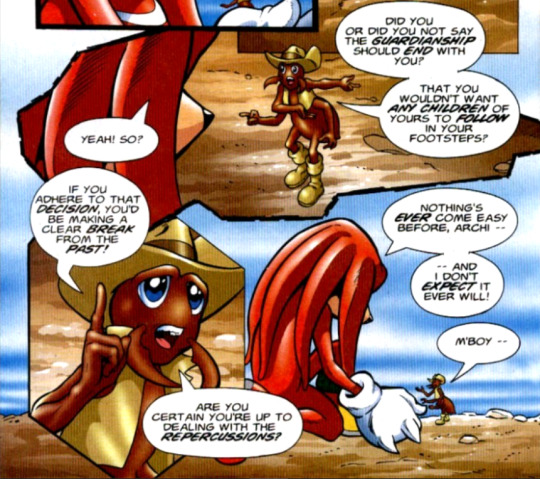
I think it makes complete sense for a slightly older Knuckles to have decided to end the Guardian tradition, given how much pain it has caused him over the years and how shady the whole operation could be. Archimedes said his goodbyes to Knuckles after telling him how proud he was of him, and Knuckles used his guiding star gem to head back home. Once there, he was shocked to find Lara-Le crying and distraught, and all she could manage to say was that something was wrong with Locke. Wynmacher called a cab and took them both up to the hospital in Echidnaopolis, where the doctors revealed to him that his father was getting weaker by the day and they couldn't figure out what was wrong. After some exploratory surgery, they determined that he'd developed pancreatic cancer and didn't have long left for the world, so a stunned Knuckles and Lara-Le were allowed to enter the room to speak to him once he'd woken up. From here, I'll let the next couple of pages do the talking for me.
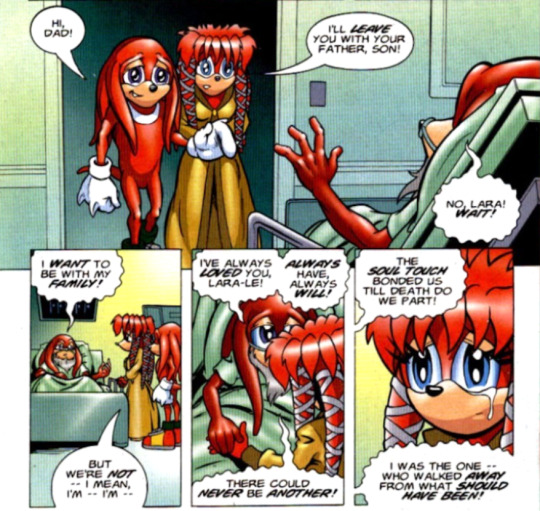
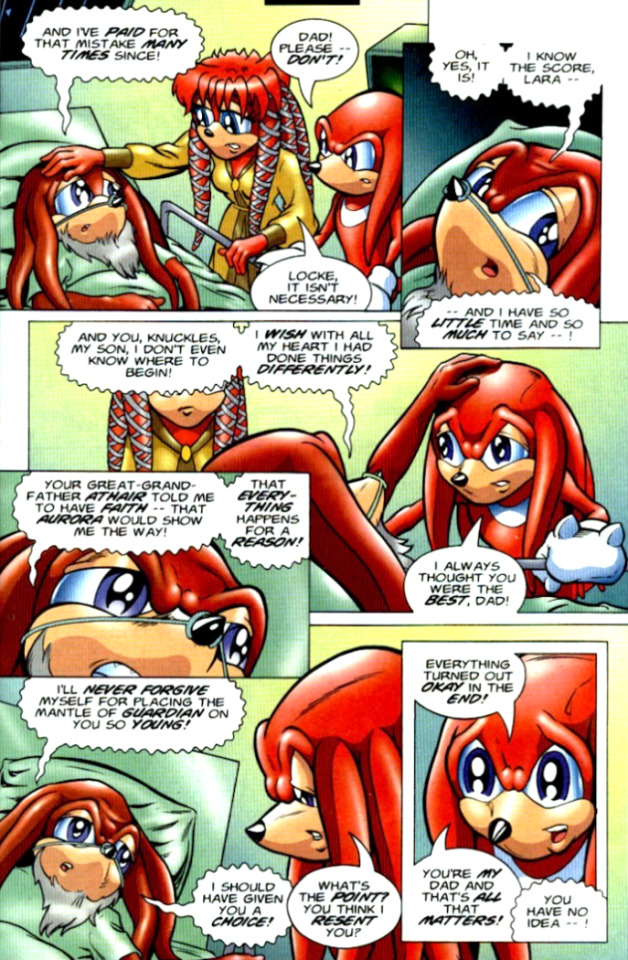
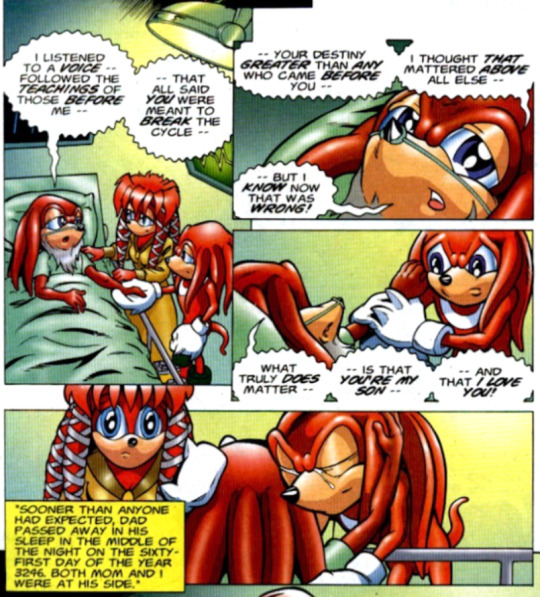
I think this is literally the best thing Penders could have possibly written on this subject. I've pointed out how awful Locke has been many times, and one of my biggest criticisms of him was less about the character himself and more about how Penders handled writing him. Locke was based on Penders' own father, with whom he'd had a difficult relationship, and this colored his writing of Locke a bit for the worse. Locke was in many ways abusive, selfish, and distant from his son, and put Knuckles through hell for his own purposes. He was too shortsighted to see how this was affecting his son, and only when reality began to harshly and repeatedly bitchslap him in the face did he even begin to realize how badly he'd messed up. This has always been clear from the outside, but it's also obvious that Penders, naturally, wasn't keen on writing a character based on his own father as a bad guy, and the end result was Locke being portrayed in a bizarrely sympathetic light as he manipulated, spied on, and betrayed the trust of his son without any self-awareness at all. This scene is exactly what we needed in the light of all that - a scene where at the end of everything, Locke truly realized just what he'd done to the two people he loved most in the world, fully owned up and admitted to all his mistakes, and asked for forgiveness. He makes no excuses for his actions, instead laying it all bare and trusting them to judge him fairly on his own deathbed. I've said before that Locke would have been far more fascinating as a well-intentioned but too-extreme antagonist of the story, and ultimately this is exactly the kind of redemption scene I would have imagined for him at the end of said story. I may make fun of and even get angry with Penders from time to time, but I truly think that this is one of the prime examples of where his writing shines. He has great ideas, just often bad execution of said ideas. This is one time where he did it right.
Knuckles finishes reminiscing and comes back to himself in the present, standing in front of his father's grave, and begins to realize that in a way, he's been repeating the same mistakes that his father did with his own daughter. While Locke never gave him the choice not to become a Guardian, he's done the inverse with Lara-Su, never giving her the option of Guardianship at all. He decides that he's going to give her the choice after all, and thanks his father at the grave while Locke's ghost and Aurora watch proudly from the afterlife. And you know what? This is also a great scene! Because I 100% believe that Knuckles, after going through everything that he has, would want to end the tradition of Guardians and never put the island's fate on the shoulders of one person again. Let's face it, he's downright traumatized by some of the things he's seen and been through, and once he had a child of his own he'd want to protect them from going through any of the same things he did. And I fully believe that with that mindset, he could end up stumbling into the same "my way, no highway option" mindset that his own father had, just in reverse. He never realized just how his own hangups were affecting his daughter until he came here to meditate after all her pestering. And what makes this scene so great, ultimately, is that he learns from it. He doesn't continue down the manipulative, restrictive path that his father did, but rather opens up to the thought of listening to what his own daughter wants, and allowing her to make her own choices in life. This issue ends with a tribute to Penders' own father Kenneth, who lived from 1934 to 1982, and I find it a fitting end indeed. After all, for all my criticism, I can hardly condemn a person for wanting to pay loving tribute to their own parent. Good job, Penders - this issue's story was genuinely enjoyable, and I appreciate the work you put into it.
#nala reads archie sonic preboot#archie sonic#archie sonic preboot#sonic the hedgehog#sth 143#writer: romy chacon#writer: ken penders#pencils: art mawhinney#pencils: ken penders#colors: joshua d ray#colors: aimee r ray#colors: jason jensen
3 notes
·
View notes
Text
Justice for Icebox and other memorable women in classic football movies

Becky “Icebox” O’Shea (Shawna Waldron) takes the field with her cheerleading skirt still on in Little Giants. | Little Giants/Warner Bros.
Unfortunately, in this case life still imitates art.
The first time you meet Icebox, arguably the protagonist of the 1994 classic Little Giants, is at pee-wee football tryouts. “Gentlemen, suck it up!” the coach shouts at the group of disheveled 10-year-olds, until one finally lays out the ball-carrier with a satisfying thud. “Oh baby, now we’re talking,” he says with a grin, running over to the group. “Nice pop, Icebox.”
“Thanks, Uncle Kev,” she replies, her long brown hair tumbling down as she pulls off her helmet. It’s intended to be a shock. “Can you BELIEVE a GIRL is playing FOOTBALL?!” the director practically screams at the viewer. But that shorthand — the reveal that beneath the comfortable anonymity of the helmet lies a girl — and its close relative, the ponytail sticking out from beneath the helmet, have become ubiquitous to the point of cliché throughout both popular culture and coverage of girls and women playing sports society still doesn’t expect girls and women to play.

Little Giants/Warner Bros.
The viewer sees Becky “Icebox” O’Shea (Shawna Waldron) for the first time — just after she takes off her football helmet — in Little Giants.
Yet for some reason, the helmet hair phenomenon still works despite the fact the movie is almost 30 years old. It’s enough of a twist to get your attention, in the same way that girls and women playing football still garner coverage based on nothing more than their decision to suit up — though they’re just the newest of more than a century’s worth of “girl gridders.” The seemingly immutable expectation that girls don’t play football, won’t play football and aren’t interested in football, though, has been repeatedly contradicted on the silver screen just as it is in reality. In fact, some of football’s most iconic films have featured girls and women who subvert that exact expectation, even as they reinforce a whole slew of other sexist stereotypes.
The central conflict of Little Giants — ostensibly a film about the (spoiler alert) triumph of dweeby male underdogs — is sexism. (It’s currently streaming for free on IMDBTV.) Becky “Icebox” O’Shea is introduced as one of the better football players her age, more than hanging with the boys at tryouts and putting one in a headlock when he gives her guff. Yet, of course, it’s not enough to make the team, a reality that is presented to the viewer as immediately, unequivocally unfair. “What about Becky?” her father Danny asks the coach, Kevin, who is his brother and a retired football star. “She’s better than half of those boys.”
“Danny, I hate to break it to you but Icebox is a girl,” Kevin replies. “Maybe if you started treating her like a girl, she’d start acting like one.” His response clarifies that he is the central villain; soon after, his own wife calls him “pigheaded and chauvinistic” for not letting Becky on the team. Becky, disappointed but unfazed, bands together with the other rejects to form a new team (after single-handedly running off their bullies), and the Little Giants are born.
One of the more compelling aspects of the movie is that the few characters who are skeptical about Becky’s ability — mainly Kevin and a late recruit named Spike — are unsympathetic. All the other kids and adults readily accept her passion and talent for the game. Her gender is never mentioned as a potential hindrance, and when she opts out of playing, the rest of the team is not just sad but afraid to compete without her. “Without Becky, we’re cream of wheat!” laments the kicker.
The same can’t be said of 2000’s Remember The Titans, the Disneyfied version of a true story where football is presented as a foolproof way to solve racism — and the directors make a halfhearted attempt to shoehorn sexism and homophobia cures in, too (intersectionality … question mark?). In Titans (currently streaming on Disney+), Sheryl Yoast, the nine-and-a-half-year-old daughter of the assistant coach Bill Yoast, is a football fiend to the point of practically being a savant. Like Becky, she’s depicted as the only child of a single father, a similarity that was far from coincidental: the real Sheryl had three sisters, lived with her mother, and didn’t care about football at all.
The heavily-fictionalized Sheryl (played by a young Hayden Panettiere) taps into a few different clichés. She’s extremely precocious, and precocious children are one convenient way to diffuse tense scenes (of which there are plenty in Titans). Her constant presence (explained by the passion for football and the single-parent family) makes Yoast more sympathetic, when he might otherwise seem uncomfortably similar to all the other racists in town. Mostly, her presence reiterates the idea that girls who like football must be explained. Without the feminizing influence of a mother, these films argue, it’s only logical girls will deviate from heteronormative expectation and dive into sports, which are still ultimately gendered male.
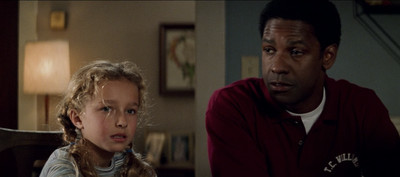
Remember The Titans/Walt Disney Pictures
Sheryl Yoast (Hayden Panettiere) and Coach Boone (Denzel Washington) watch film together — with Yoast offering some harsh words for his offense — in Remember The Titans.
“Why don’t you get this little girl some pretty dolls or something?” the otherwise undeniably great Coach Boone asks Yoast at one point, as Sheryl scowls. “I tried — she loves football,” Yoast replies. By the middle of the movie Sheryl and Boone are grinding tape together.
That brief moment of acceptance is about as good as it gets for Sheryl, despite the fact she’s the one who, at the movie’s most pivotal moment, compels her father to finally collaborate with Boone to win the state title. “Mama, are all white girls that crazy?” Boone’s own daughter asks at one point — a memorable line that unfortunately once again reinforces Sheryl’s difference, which is repeatedly shrugged off until it is ultimately ignored. Her interest in the game, convincingly depicted throughout the film, is nothing more than a means to an end.
Becky’s bugaboo, in contrast, isn’t that people don’t take her interest in the game seriously. Instead, it’s the other side of the double-edged sword that women in sports have to confront: the idea that sports are inherently anti-feminine, that it is impossible to play them wholeheartedly without implicitly rejecting all the things (white supremacist, cisheteropatriarchal) society deems valuable about being a woman.
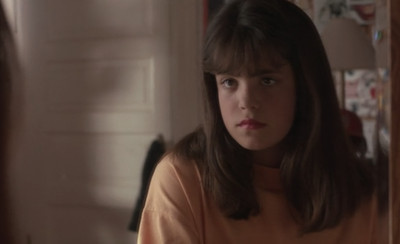
Little Giants/Warner Bros.
Icebox tries on lipstick as she debates quitting football and becoming a cheerleader in Little Giants.
It’s wrapped up in her nickname, Icebox: When “hunk” Junior Floyd joins the team (keep in mind they’re all supposed to be around 10, which makes it a little weird), Becky’s instantly conflicted. “I’m the Icebox, the Icebox doesn’t like boys … I don’t get crushes,” she says as she eats powdered donuts straight from the box (the film’s proof positive of her lack of self-conscious femininity). Even at that early age, it’s presented as a given that girls will understand playing sports is perceived as antagonistic to heterosexual romantic relationships.
That internal conflict ties her to one of the least sympathetic women in football cinema, Any Given Sunday’s owner/general manager Christina Pagniacci (played by Cameron Diaz). For how nuanced a picture the Oliver Stone classic (currently streaming on Netflix) paints of life in professional football, the portrayals of women throughout the film are two-dimensional to the point of being confusing. (Why on Earth does Cap’s wife hit him when he says he wants to retire? Even the most stereotypical gold digger presumably has a little heart.) But Christina gets the most screen time out of any of them, enough to depict her character as Icebox ... if all Icebox’s worst fears were realized.
Pagniacci’s behavior throughout the film doesn’t seem much worse than how billionaire sports team owners are prone to acting (that is to say, very badly). She wants to move the Miami Sharks to Los Angeles to take advantage of tax incentives (where have we heard that one before?). She argues with the head coach constantly, which is presented as excessively combative even when she’s right — as in her insistence that the team should invest in the passing game and stop running the ball so much (how is this movie 20 years old?). She pushes to keep players on the field even when they’re not healthy, and her involvement in the team is centered on growing profits (which, obviously — that’s how ownership thinks).
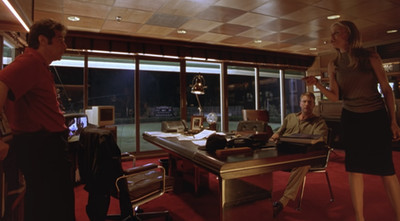
Any Given Sunday/Warner Bros.
One of many disputes between Christina Pagniacci (Cameron Diaz) and Coach Tony D’Amato (Al Pacino) in Any Given Sunday.
But it’s a lot easier to make ownership the villain when ownership is a woman. Christina was modeled after late Rams owner Georgia Frontiere, who moved the team to St. Louis and had already inspired several money-grubbing, ice-queen lady-owner characters. Pagniacci’s greed and calculation are repeatedly lamented by the other characters on gendered terms: Instead of being savvy and pragmatic she’s hard-edged and heartless, characterized as such by a bunch of people who themselves could easily be described that way.
“He wanted a son more than anything else in the world, and when you really think about it, what Christina is is just such a tragedy,” her own mother tells Coach D’Amato (Al Pacino) within earshot of Christina, who cries silently in the next room (another confusing scene). “I honestly believe that woman would eat her young,” mutters the league commissioner towards the end of the film. It’s not enough for her to merely be the bad billionaire boss, which would be easy enough to make convincing. Pagniacci has to be presented as cold and distant — intrinsically undesirable, despite the fact she’s conventionally attractive — to make her villainy irrevocable. For women, there’s no redemption from men not liking you.
That’s what Becky realizes by the midpoint of Giants. In a patently strange scene, she sits down with her sexist uncle, torn up about why Junior doesn’t seem to like like her. “He’s probably gonna want some cute girl, not some teammate,” the fully-grown man tells his 10-year-old niece. “But I don’t know about being a cute girl — I’m good at sports,” Becky replies (again, being a girl and playing sports are shown as intrinsically at odds). “You have a lot more to offer than football,” her uncle says very creepily, in another classic deflection: sports are too bad or dumb or boring for a nice girl like you. “Do you think I’m pretty?” she asks. The strings swell, and Kevin replies, “I don’t think you’re pretty … I think you’re beautiful.”
The scene is so, so odd, and deeply out of sync with the rest of the movie to that point. Kevin was an unrepentant misogynist and then, suddenly, his “guidance” (telling Becky to be a cheerleader) is shown as positive. Becky takes his advice, quits the team before the big game and only comes back late in the game with her cheerleading skirt still on. It’s visual evidence of the compromise she’s already made: it won’t be possible for her to have both of the things she wants — the attention of boys and the chance to play sports — so something’s gotta give. It would be less depressing if it weren’t so often a reality: girls drop out of sports at remarkably high rates after puberty.
Becky’s star turn and unsatisfying conclusion probably shouldn’t have come as a surprise. Of course a girl was the center of an underdog story: Who’s more of an underdog in sports than a girl? Little Giants ends with the Annexation of Puerto Rico, a problematically-titled, game-winning play that holds a beloved place in sports lore. The play begins with Becky charging down the field, drawing all the defenders to her — after all, she’s one of the best players on the team. Once the opposing players are concentrated around her, she opens her arms: no ball. It was all just one, long fake.
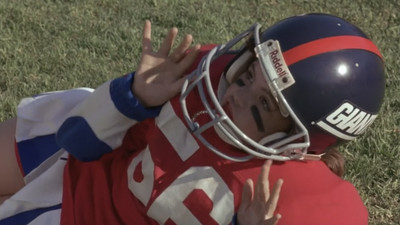
Little Giants/Warner Bros.
Icebox reveals the fake during one of Little Giants’ most memorable moments, the Annexation of Puerto Rico.
2 notes
·
View notes
Text
Dragon Ball Super: Future Trunks Arc REVIEW:
(Warning: This review contains spoilers.)
Far from now, in a distant time.** I, Zamasu, immortal lord of the Kai’s, UNLEASHED AN UNSPEAKABLE EVIL! But a foolish Saiyan warrior, wielding a giant sword, step forth to oppose me. Before the final blow was struck he tore open a portal in time, and ran away from the future, where my evil was LAW! Now the fool seeks to return to the past, and undo the future that is Zamasu!
Gotta get back. Back to the past, stop Goku Black. Wa-Watch Out!~
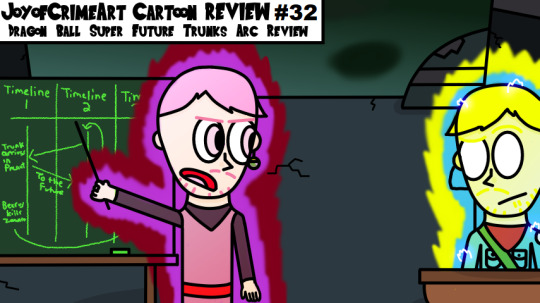
Hello everybody, my name is JoyofCrimeArt, and it’s been…a while since I talked about Dragon Ball Super. Long enough that my plan to review the arcs as the English dub comes out are pretty much dead. But I’m here now, and ready to review the next chapter in the Dragon Ball saga, the “Future Trunks” arc. Which honestly, is a stupid name cause we already had a “Future Trunks” arc. It was called the Android and Cell saga. Why didn’t they just call it the “Goku Black” arc? But whatever. With each arc in Super surpassing that previous one up to this point, will this arc be able to continue the trend? That’s what I’m here find out. Also, given that this arc is a bit longer than the previous ones, I’m going to skim over or abbrev certain things for the sake of time. (Trust me, when we get to the Universe Survival Arc you’ll be glad I’m doing this.) But with all that said, let’s dive in.
The arc begins in Future Trunk’s timeline years after he defeated the androids. And…things are somehow even worse. That’s right, there world has had TWO apocalypses in the span of about thirty years or so. The few remnants of humanity have been forced into hiding as a small resistant stands to fight against this new threat. This resistance, consisting of Future Trunks, Future Bulma, and a future version of Mai of all characters, has one mission in mind. Rebuild the time machine and travel back in time to get help from the past, to help them stop this new enemy. And who is this new enemy? It’s none other than Goku. Or at least, an evil villain impersonating Goku, known as Goku Black. A name that probably sounds a lot better in Japan than it does in a country that has with a sizable black minority, like America.
https://www.youtube.com/watch?v=GDYJO-1IhN8
…Big oof.
But let’s talk about Goku Black for a minute. Now, the idea of making a character that’s designed to be an evil Goku isn’t really anything new. (I mean look at Turles.) However what makes Goku Black, and this whole arc in general, really stand out is the mystery aspect. The whole first half of this arc is all about figuring out who, or what, Goku Black really is and where he came from? And they’re are clues hidden thought that hint towards a larger picture. While Goku Black sounds like Goku, even being played by Sean Schemmel, his cadence is nothing like Goku. His speech is more polite and flowery. Also he refers to Trunks as “mortal” and even “Saiyan” at several points, implying that he is none of those things. It opens questions and allows the audience to speculate. And speaking of voice, Sean Schemmel does an amazing job voicing Black in the dub. Managing to make it sound like Goku while also making it feel distinctly it’s own thing. It’s a really great performance.
Just as Trunks, Mai, and Bulma are about to finish the time machine, Black shows up and attacks. He kills Bulma and injures Mai, but Trunks is just barley able to escape. And while all of this is going on we keep cutting back to wacky hijinks in the present timeline. Things like the Pilaf Gang in school and Goku and Piccolo harvesting lettuces…which really clashes with the incredibly dower tone of what’s going on in Trunk’s timeline. Regardless, Trunk’s time machine arrives in Bulma’s yard. However, they’re not in the clear yet as Goku Black was able to follow them back, briefly, using a magical object known as a time ring.
Goku goes and battles Black. The fight is pretty one sided with Goku holding back, not going beyond Super Saiyan so he can gauge Black’s power and have a good fight. I want you all to remember this, as everything bad that happens in the rest of this arc wouldn’t have happened if Goku had just gone all out on Black from the beginning. After a bit of a brawl Black’s time ring flings him back to the future. But not before he’s able to damage the time machine. Whis notes that the time ring gives the wearers ability to travel between timelines, and are only meant to be worn by Supreme Kais. Not only that but Black’s energy feels remarkably similar to a Supreme Kai in training that exist in universe ten. So with this lead Goku, Whis, and Beerus head off to universe ten, leaving Trunks to explore the present.
When this arc was first announced, I have to admit I wasn’t really looking forward to it. It felt like it was just going to be a rehash of the Android and Cell arcs, with Trunks going back in time to stop another apocalypse. personally, I was fine with the idea of never seeing Future Trunks again, as it felt like his story was over. However, what kinda turned me around on this is all of these neat little interactions that we get to see, which we could only get by having Trunks travel to the “Super” era of the Dragon Ball timeline.
One of these great interactions is between Trunks and Kid Trunks. Kid Trunks forms this almost sibling-esq rivalry with his future self, which is honestly pretty fun to see. And we get the most elaborate two person love triangle ever devised. You see Kid Trunks has a crush on Mai, who’s actually a forty year old woman trapped in a child’s body. (But Kid Trunks doesn’t know this.) Mai, being an adult mentally, has a crush on Future Trunks. Meanwhile, Future Trunks has a thing for Future Mai, who’s is actually a middle aged woman trapped in a young adult body. So…
https://www.youtube.com/watch?v=6SC-KleaUBc
We also get to see interactions like Trunks learning that Krillin married Android 18. As well as Trunks getting to meet adult Gohan. Now keep in mind, the last time Trunks saw Gohan he just unlocked Super Saiyan Two and had just completely decimated Cell. And this is what he sees when he meets him here.

Let me explain why this image is the best scene ever. We got Trunks on the left, representing all the Gohan fans out there. We got Videl being all like _“MAI BAE!” _And then we have Mr. Satan who just looks like he’s completely high on Quaaludes and is just here for the ride.
Meanwhile, Goku arrives in universe ten they meet the universes Supreme Kai, Gowasu, along with his apprentice Zamasu. Zamasu was the former North Kai of universe ten, and is now being trained to take up the role of Supreme Kai when Gowasu eventually dies. Whis senses that Zamasu’s energy feels very similar to Black’s, but they don’t wanna tip there hand just yet. So Goku challenges Zamasu to a friendly fight to see if they’re fighting styles are similar, without telling him about Black. Zamasu is hesitant to battle a mere mortal, but he complies.
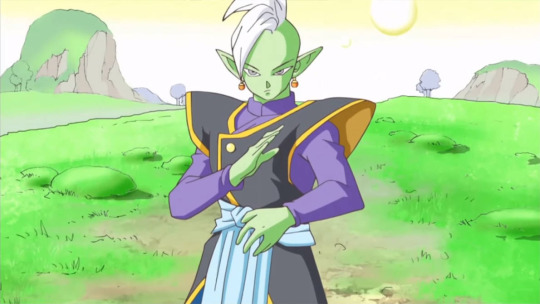
Now let’s talk about Zamasu. I’ll be honest, one of the main reasons for me doing these Dragon Ball Super retrospects in the first place was just so I could have an excuse to talk about/make fun of Zamasu. Zamasu is great, and let me tell you why. Zamasu is very different from other Kai’s in a multitude of ways. Unlike the generally peaceful Kais, Zamasu has a massive disdain for mortals. He believing that they are sinful by nature, and only cause destruction. As such. he also believes that the Kai’s should take on a more hands on approach to running the universe. When you really look at it, He’s not wrong in his assumptions. The Kai’s are pretty useless in general, and it seems like SOMETHING’S always putting the universe in danger every other week or so. So his way of thinking comes from a fairly rational place.
That being said though, it’s pretty clear from the beginning that something isn’t right with Zamasu. While he doesn’t seem outright evil, he definitely doesn’t seem nice either. And given the fact that he is the only suspect in the Goku Black mystery (and the fact that he is featured so prominently in the arcs theme song.) It’s pretty clear that he is involved in one way or whatever. Usually something like this would ruin the mystery, but it actually works here. We know Zamasu is somehow tied in with Goku Black and is probably up to no good, but we don’t know exactly how. The mystery is less about finding out WHO the culprit is is as it is figuring out HOW the culprit is committing the crime, and finding proof. It’s also a refreshing change of paste to have a villain with somewhat noble intentions, at least at the start. Most antagonist in this franchise are just evil from the start for no real reason, but it’s nice seeing a characters decent into darkness. But it’s not the motivation or the mystery that makes me love Zamasu as a character. _I LOVE HIM BECAUSE HE’S SUCH A FRICKIN’ EDGE LORD! AND THE SHOW ACKNOWLEDGES IT! _Zamasu is that emo kid who thinks he knows everything about the world and believes that he is above it all. “Cause he isn’t blinded like the other idiotic mass! He’s deep man!” And it’s just to great!

Zamasu is voiced by James Marster. At first I didn’t really like the voice, as it sounded a lot older than what I was expecting. But it really grew on me as time went on. James Marster has been a massive Dragon Ball fan for much of his life. Even agreeing to play Piccolo in the Dragon Ball Evolution movie. So to see him get a chance to finally be in a piece of Dragon Ball medium that’s actually…good. He does a really stellar job, capturing the pompousness and the insanity of the character really well. His performance is one of the arcs highlights.
Zamasu fights Goku and Goku is able to beat him in his Super Saiyan 2 form. Zamasu is disgusted that he was beaten by a mortal, and silently swears revenge on Goku for besting him. However, Goku isn’t able to make any firm connections between him and Goku Black. So he, Beerus and Whis head back to Earth.
With Trunk’s time machine was destroyed Bulma and the Pilaf gang began working on repairing Cell’s old time machine from all the way back in the Cell saga, which Bulma had kept in capsule form for all these years. As they wait for the time machine to be prepared it allows Trunks and Vegeta to do some good old father-son bonding.
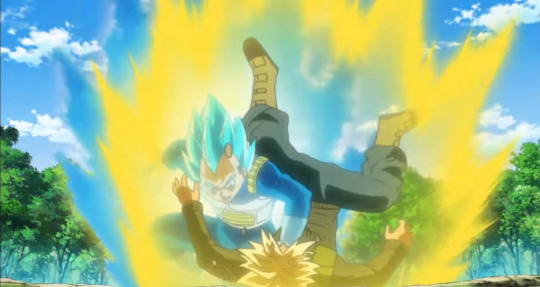
_See everybody, Vegeta’s great at helping people as long as he can do it by punching and threatening them!
_ While all that’s going on Beerus and Whis get a message from none other than the Omni-King himself. And for some reason, he wants to see Goku. The two are obviously worried as Zeno is capable of whipping out entire universe in an instant and Goku…is Goku. But with no real option Goku, Whis, and the Supreme Kai head off to Zeno’s palace to see what he wants. They are greeted by Zeno’s Grand Priest, who Whis confirms is one of the five strongest people in the multiverse. He leads them down to Zeno’s throne room where Zeno tells Goku what he wants. He wants a friend.
The gods are shocked, but really it makes sense. Zeno is just a little kid, and it must get lonely at the top. All the other deities fear the Omni-King due to the sheer amount of destructive power that he possesses. But Goku is the only one who’s ever treated Zeno like an actual person, due to just how kind and thick headed he is. This lack of hesitation has earned him the Omni-Kings respect. Goku tells Zeno that he can’t play with him right now, since he’s a bit preoccupied at the moment. But he says that when he’s done, he’ll find Zeno a friend that’s even better than he is. Zeno agrees and gives Goku a button that can summon him directly once Goku finds this friend. Goku puts this very obvious Checkov’s gun in his pocket for latter and arrives on Earth just as Bulma is finishing the time machine.
Now that it is fixed, Goku, Vegeta, and Trunks hop in the machine to face Black head on. They arrive and find they’re way to the resistance HQ, where Trunks is reunited with the Future Mai. But it doesn’t take long for them to encounter Goku Black, who through a combination of zenkai boost, and getting a better handle on Goku’s body, is much stronger than he was during his first encounter with Goku. He’s even able to transform into his own twisted version of Super Saiyan Blue known as Super Saiyan Rose.
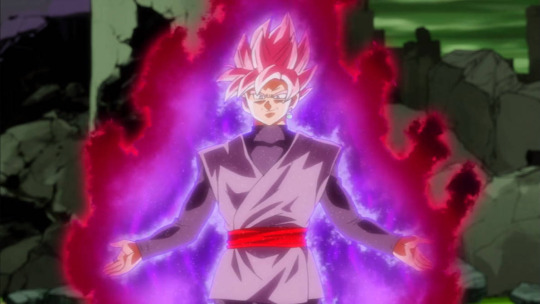

Vegeta, ready to beat up anyone who looks like Goku, attacks Black. And as we know, every time Vegeta fights the arc’s main antagonist, it-it usually goes really well for him, so we shouldn’t have anything to worry about-
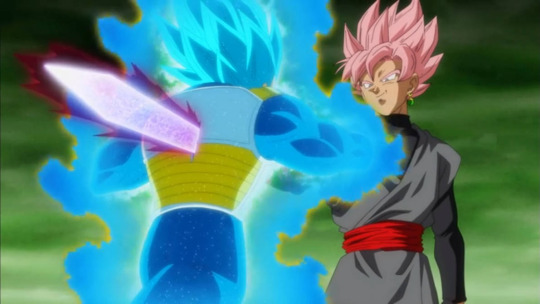
_VEGETA! You’re suppose to learn from your past mistakes! _
And if all that wasn’t bad enough, a time portal opens up in the sky revealing Zamasu. Or at least, a future version of Zamasu with potara and a time ring. That’s right, Zamasu isn’t Black, he’s working with Black. (Or so it seems at least.) The three try to battle the duo in a really well done fight scene, but they notice something about this version of Zamasu. No matter how much damage they inflict on him, he just heals from it seconds after. He’s somehow invincible. This, coupled with Goku Black’s new power, is simply to much for our heroes to handle. Luckily, they’re able to just barley about the escape in the time machine in the nick of time due to Mai distracting Zamasu and Black.
Meanwhile, the present version of Zamasu is becoming more and more fascinated with Goku. Gowasu is as well, and even does some research on him on Godtube. The actual thing that actually exist in this universe and is an important plot point. That’s right, apparently the entire Universe Six tournament was actually live streamed this entire time!. Though I can’t speak to the validity of Godtube as a platform. Heard they’re copyright system is pretty bad.

Dang it, Toei!
Zamasu see’s Super Saiyan Blue Goku’s fight with Hit and is furious that a mortal like Goku is able to achieve such Godly powers. And it’s at this point that you realize that Zamasu is really just the Frank Grimes of the Dragon Ball franchise. And Goku is _Homer. And I’m okay with that…
_But this is where Zamasu learns about the Super Dragon Balls. He goes to Zuno (The all knowing alien from the last arc.) and demands information from him. And this is where Zamasu comes up with his plan. He’ll use the Super Dragon Balls to swap bodies with Goku, than use the time rings to travel to a different timeline, and team up with a parallel version of himself. Then THAT Zamasu will use the Super Dragon Balls in order to wish for immortality. Than they will begin they’re plan to whip out all mortal life from the multiverse. Convoluted enough? But hey, at least unlike other villains he plans on wishing for immortality BEFORE engaging our heroes.

But before he can do this, he needs to kill Gowasu first. As only a Supreme Kai can use the time rings. Goku, Whis, and Beerus begin to figure out this plan. (They figure parts of it out later, but I’m abbreviating this for the sake on length.) They travel to the tenth universe and catch Zamasu in the act of murdering Gowasu, but Whis uses his time rewind powers to save him. It’s honestly a clever and unexpected twist. Seeing the ability again here makes it feel less like it was something only invented to get our heroes out of a jam in the Resurrection ‘F’ arc. Even if it still most likely was.
Beerus, being sick of having nothing to do this arc, destroys Zamasu. They return to Earth to tell Trunks about the good news. Trunks tries to explain that time travel doesn’t work that way in this universe, but Beerus just wants this arc to be over with and buggers off. Trunks, Goku, Vegeta, and even Bulma decide to go to the future and see if everything’s all right. Now, I know what your probably thinking. Shouldn’t they have some kinda plan to fight Zamasu and Black just in case they are still in the future? Or at the very least, do some training first? But, y'know, they’ll probably just cross that bridge when they get to it.
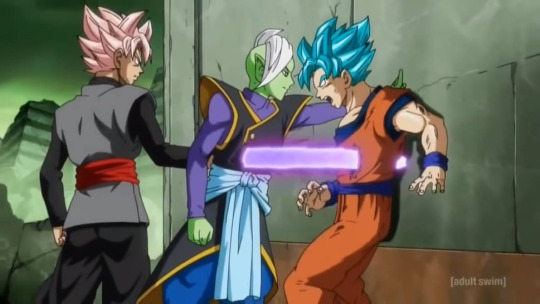
_GOKU! You’re suppose to learn from your past mistakes!
_ Things come to a head when Black and Zamasu point out that all of this has been a self fulfilling paradox. If Trunks never went back in time in the first place, Goku would of never met Zamasu, Zamasu wouldn’t have become Black, and the future wouldn’t of been destroyed. And since I didn’t know where else to point this out, I just wanna praise that that fact that everything that has happened in this art does follow the rules of time traveling that the story established. Given how losey goosey Dragon Ball can be with it’s own lore and consistency, I was sure there would be some kind of plot hole regarding something as elaborate as time travel. But, surprisingly, they went through the effort to keep everything consistent. They forgot what color hair Trunks was suppose to have, but they got this right. So kudos.
Trunks is furious when Zamasu and Black point out that, in a way, this is all his doing. He has a breaking point as the two mock him. And in his anger, he develops a new transformation. Super Saiyan…they never name it in the series proper. I know that it’s called Super Saiyan Anger or Rage or whatever the translation is, but they never name it in the series or explain what exactly it is beyond a form that is formed via anger. _AKA: ALL THE NON GODLY SAIYAN FORMS, CAUSE THEY’RE ALL FUELED BY ANGER! _

That being said though, despite the lack of real explanation on how it works and the fact that it doesn’t really add much to the plot, I have to say it’s one of the coolest looking forms in the series. Like Super Saiyan Blue Kai-o-Ken it has two aura’s, as well as incorporating elements from Buff Super Saiyan form used in the Cell saga. I wish they elaborated on it more, cause this design feel way too cool to be this quote unquote generic.
Trunks holds Black and Zamasu off while the rest of the group travel back in time on more time in order to find a way to actually STOP Zamasu and Black for good. Goku goes to Roshi in order to learn how to do the Evil Containment Wave, in hopes of being about to seal away Zamasu rather than kill him. Meanwhile Vegeta goes to train for twelve hours in the hyperbolic time chamber. They return to the future to have they’re final rematch with Black and Zamasu.
While this is going on Beerus realizes that he’s failed to kill Zamasu and actually feels bad. Not bad enough to go and help, but bad enough to send Gowasu and Shin to help in his place.
They arrive in the time machine, which Black immediately destroys, also damaging the jar they were planning on sealing Zamasu in. See, unlike other villains, Zamasu and Black are actually proactive. I like that. It’s up to Trunks, Mai, and Bulma to fix both the time machine and the jar. Fighting ensues as Vegeta just wails on Black. Black realizes that anger can result in him getting more strength, so he channels that anger into…a scythe…that he uses to open a portal in space time, that creates clones of himself….being angry did this. Ah, whatever, the arc’s almost over. Who cares?

_So, could Vegeta and Goku do this too? I can’t think of any logical reason why they shouldn’t be able to.
_ While Goku and Vegeta are busy with the clones of Black, Zamasu heads for Trunks. The only hope is for Trunks to preform the Evil Containment Wave. Luckily Bulma has a video of it on her phone for Trunks to use as a reference. Bulma goes out to buy him some time by trying to seduce Zamasu in one of the greatest scenes ever put to television, and Trunks is able to successfully preform the move, trapping Zamasu in the jar forever…
Or at least he would of if Goku hadn’t forgot the seal! _TWICE! TWICE GOKU FU*K UP IN STOPPING THE VILLAINS! _Since Zamasu’s free, he realizes that it’s time to take these mortals seriously. So using the potara earrings he fuses with Black, becoming FUSED ZAMASU! Who manages to somehow be even more of an edgelord than he was before!
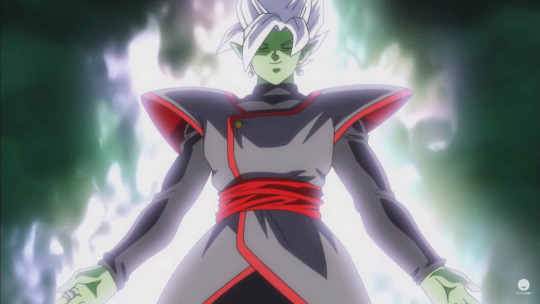
_AND THIS…IS TO GO…EVEN FURTHER…BEYOND! IT’S SUPER SAIYAN EDGE!
_The three of them simply aren’t strong enough to stop Zamasu in this state. They’re only hope is to use the potara themselves and fuse into Vegeto! Which is retconned into only being permanent with Kais. Cause fusions are popular and they’re going to milk it for all it’s worth. Even though they could of had them return to normal without the need for a retcon cause it’s been established that the dragon balls can undo a fusion…but who cares? Now they only stay fused for an hour, but the more energy they use, the shorter amount of time they can be fused. They fuse and go Super Saiyan Blue and we get one of the best fights we’ve had in the series thus far, despite it only being about two minutes. The fluidity of the animation is done in a way that Dragon Ball has never really done up until this point, and resembles a fight from _One Punch Man _more than Dragon Ball.
It’s during this fight that they discover how to beat Zamasu. While Zamasu was immortal Goku Black wasn’t. When Zamasu took Goku’s body he also inherited many of his Saiyan traits, including lust for battle and his desire to have a proper challenge. As such he never wanted immortality and now that he and Zamasu are fused together, he isn’t wholly immortal anymore, and his body begins going into flux. Unfortunately they burn up they’re energy to quickly and defuse before they’re able to kill Zamasu. Unable to even transform anymore due to how depleted they are, it’s up to Trunks to stop him. All the resistance members cheer Trunks on, and they’re hope and belief in him forms into a mini spirit bomb that he channels through his sword. He uses this energy to defeat Zamasu by slicing him in half. Dick first no less.

This ending seemed to be a bit divisive when it first came out, with many people saying it was a Deus ex Machina. And I have to say that I kinda agreed with a lot of the criticism when I first saw it. Trunks learning the Evil Containment Wave so fast via just one video he saw was one thing, but the spirit bomb is literally a move that he never learned. Nor even really had an opportunity to learn. However, while it doesn’t make sense logically, this ending does work really well in a thematic sense. It ties in to the arcs, and even all of Super in general, theme of mortals rising up to reach a power beyond the Gods. It shows that, when all of humanity works together for a common ideal, they is no limit to there power. Cause in the end, humans where able to do what the Gods couldn’t. Beerus’s plan to kill Zamasu failed. Shin and Gowasu’s plan with the potara’s failed. Even Goku and Vegeta’s plan of using God Ki failed. In the end it was all of humanity, giving they’re power to Trunks, they’re one hope, that was able to defeat Zamasu once and for all. And it shows that Trunks was able to save his own future, without needing to rely on Goku and Vegeta or Gohan or anyone else. Zamasu and Black where his problem, and he had to be the one to stop them.
So that was my review of Dragon Ball Super: Future Trunks arc. So what are my final thought…and wait. What do you mean they’re one more episode left?…
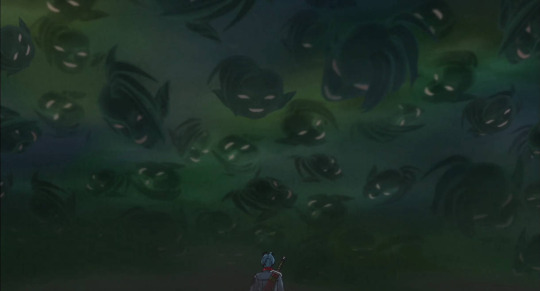
…Oh no…
So Zamasu, being truly immortal, isn’t killed by his body being destroyed. He simply transforms into an ethereal state, in honestly one of the most horrifying things Dragon Ball has ever done. He turns into Gygas from Earthbound and in one attack levels the Earth and whips out all of humanity minus our heroes. Without a body there’s nothing for our heroes to fight, and all hope seems loss. Until Goku remembers Zeno’s button and calls him for help. This summons the Future Zeno, which is weird cause you’d think God would be like beyond the confines of space and time, but apparently he isn’t. Zeno see’s all the damage Zamasu has done and decides to deal with this by destroying the timeline completely. The gang escape in they’re time machine before being erased too. You know, I was joking around with the Samurai Jack comparisons at the beginning, but that’s basically what ends up happening. Goku returns to the void that was once Trunks timeline and grabs the Future Zeno and brings him to the present. He goes to present Zeno and tells him that he’s found his new friend. We also learn that the Grand Priest is Whis’s dad.
After returning to Earth, our heroes discuss what to do now. Whis mentions that when Beerus killed the present Zamaus it created a new time ring, and that Trunks and Mai could use that to travel to a new future. One that never had Zamasu in it. That’s right, they’re taking the Rick and Morty approach. “Close enough, right?” They fly off in the time machine together and then the arc ends.
Now, I will say this. Having the guts to have an arc like this end on such a bittersweet note is definitely a ballsy move. In a world where so many problems can be solved by just collecting the Dragon Balls, I like the idea of their actually being serious consequences that can’t be fixed. But because this all happens in the last episode of the arc, there’s no time to let this sink in. And the ending is just to depressing. The arc basically ends on-
https://www.youtube.com/watch?v=0Ufmrn7BCuA
Everyone in Trunks timeline is dead. Not just dead but erased from existence completely. Trunks failed to save his future, making not just this whole arc pointless, but the Android and Cell saga pointless too! Why even go to a new timeline at all? Why not stay in the present timeline? At least you know these people! Everything Trunks said about the power of humanity working together was wrong. Humans couldn’t stop Zamasu. They needed the power of a God to save them. And the entire DESTRUCTION of an entire timeline could of been avoided if Goku hadn’t summoned Zeno. Or if he had just brought the dang seal. Or, you know, if he defeated Black in their first fight!
So yeah, in conclusion, I feel very mixed on this arc. There are a lot of pros. Zamasu and Black are both fantastic villains who in my opinion deserve more recognition. Also it’s refreshing just to have a new Dragon Ball villain, as appose to all the other arc antagonist who are rivals or…Frieza again. I appreciate the darker tone and the feeling of actual stakes, which is something the last two arcs felt particularly lacking in. And I also enjoy all the fun moments we get seeing Trunks interact with the older Z fighters. But man, does the ending kill a lot of what the arc had going for it. Also the arc drags a bit in parts, as personally I feel you could cut out at least one of the trips to the future. Overall, I think I’d say the arc is still the best arc the series has had so far, but it’s defiantly a case of higher highs and lower lows. But at least we don’t have any evil Goku’s to worry about.
Cause the one we have is enough trouble as it is.
So that was my review of the “Future Trunks” arc of Dragon Ball Super. What did you think? Feel free to leave any thoughts you have in the comments down bellow. I’d love to hear them. Fav, follow, and like the review if you’d enjoy and have a great day.
(I do not own any of the images or videos in this review. All credit goes to there original owners.)
https://www.deviantart.com/joyofcrimeart/journal/Dragon-Ball-Super-Future-Trunks-Arc-REVIEW-793870861 DA Link
5 notes
·
View notes
Text
Review #55: Suddenly Seventeen

Written and Directed by Zhang Mo
I didn’t know this movie would be this deep. Really.
Came for Darren Wang. Stayed for the female lead. Started off thinking it was a typical and mediocre time-travelling romcom, told myself to keep watching for Darren Wang, and ended up blown away.
I really thought it would be a typical time-travelling romcom. I honestly thought Liang would just be transported back ten years. But NO. This was where I was first surprised. Instead of taking her back to the setting of her seventeen year old self, she actually just changes... in her mind. Her mind becomes seventeen. I found that so refreshing. When she looks at her reflection on the car window after the first chocolate, I thought, “What? She doesn’t look younger at all.” I thought that was what Liang was looking at - the fact that she’d changed into the seventeen year old self and she was physically younger. But no. Same body, just younger mind. That was the first thing that I found new and refreshing.
The second surprise came when Liang changed back. I was expecting the entire film to be about Liang living her seventeen year old life, and doing or undoing whatever mistakes she’d made. But no. What happens is that the chocolate only lasts 5 hours, and Liang goes back and forth between Little Liang and Big Liang. At first, I thought the premise was sloppy and that the film wouldn’t be able to carry it out well. I really underestimated the film (slap). I think it’s because there are just so many of these time travelling romcoms that follow the exact same path, and I guess I expected the same for this one. I watched, half skeptical, half not expecting anything, as the film presented us with its theory: one chocolate lasts 5 hours, and camera flashes bring Big Liang back. I think I felt the sloppiness with scenes such as Liang randomly reaching for the chocolate whenever she was sad - like, even when people are sad, they look at what they’re eating, you know? Especially if you have to take off a wrapper to get to the food??? And it was just so CONVENIENTLY COINCIDENTAL that the one chocolate was right there. And that Little Liang threw down the book that contained the rest of the chocolate. Those things. I’m really not a fan of convenient coincidence. Make it make sense.
But other than that, once I got past that and became more and more immersed in the story, I started really liking it, and was blown away by some aspects. Like I said before, the film takes the time travelling romcom a step further, and what I absolutely loved was how Little Liang and Big Liang began communicating with each other and actually started building a relationship. Not only were they helping each other out and getting to know each other (Big Liang reconnecting with her past, teenage self), Big Liang actually became somewhat of a mother/big sister role to Little Liang near the end, which I found really moving.


The third aspect I found refreshing was how Little Liang and Big Liang became the main relationship line, and how they were almost each other’s antagonist. I honestly squealed with delight when they started going against each other, like the scene where Little Liang puts herself among those zombies before turning back into Big Liang, or when Big Liang eats the chilly chicken before turning into Little Liang. I also loved the scene where Big Liang just nonchalantly kisses Yan and then asks him to take her home, making Yan shout out, “Are you playing me or what?” It was hilarious. I don’t think I’ve seen a time travelling romcom that puts the future and past selves together in such proximity and makes them the main relationship line. They usually build relationships with other people or, if it was a typical one from that genre, I guess Liang would be mending her relationship with Mao or pursuing a new life with Yan. But instead the film is all about finding yourself and being true to yourself again, and not giving up on your dreams. Being yourself first and foremost before being one with someone else. Liang had lost herself during those ten years. When the film first started, I have to say that I was annoyed at how much Liang’s life was based on Mao. I’m glad I kept watching and got to see Liang change and become independent. Even in the end, even when she does seem like she’ll consider Mao again, I felt happy for her. Because she had changed, and she would now live differently even with Mao by her side. In fact, I think it wouldn’t have made sense if she fully rejected Mao. It’s more like her to consider Mao again and I actually like the theme of reconciliation. Becoming independent and strong and finding yourself doesn’t always mean fully breaking it off with your lover/husband/etc. Sometimes it means mending relationships and stepping into it again as a stronger person. Both Liang and Mao had things to learn, and they changed in the end. I’m sure their relationship would work out so much more positively.

You know how we’re always told to be nice to ourselves, to cheer ourselves on, to be our own best friend. That’s what this film reminded me of. It was like a huge metaphor for that. Big Liang finally got to see who she used to be, and how much she’d changed. Neither of them were perfect, and that’s why they needed each other. We can’t live as our teenage selves forever - one day we have to grow up and mature - but we can’t live as our adult selves and shed those pure and childlike qualities we used to have either. Little Liang definitely had qualities Big Liang had lost. And I really loved how Big Liang learned to become independent and stand on her own two feet even without Little Liang. Like the water scene, that didn’t mean she had lost Little Liang. It simply meant that Little Liang was now a part of her, and Big Liang needed to remember the child she used to be.
Little Liang was a pretty good influence on Big Liang. As I watched, I thought back to my own seventeen year old self. If I had an experience like that, would Little Me be a good influence on Big Me? Funnily enough, Big Liang in the movie is the exact same age as I am now - which made me think even deeper about this concept. As a seventeen year old... I definitely wasn’t like Little Liang. When I saw Little Liang overdosing on the chocolates and running to catch Yan at the train station, I honestly... I honestly sat there thinking, “That’s what young love is.” I had no thoughts of stopping Little Liang, or chastising her, or lecturing her about how much of a playboy Yan actually is and how he doesn’t deserve her blah blah. You know, older sister/mother talk. Instead, all I felt was sadness for Little Liang, and I totally accepted her feelings and her actions and just felt sad for her. 안타까웠고 I couldn’t help thinking that that’s what seventeen year olds do when they’re in love. I usually don’t like films that have characters say they love each other when they hardly even know each other, but for some reason, this film made sense. It was just very realistic for two teenagers to act that way.
Back to thinking about my seventeen year old self - I guess that would be me in my last year of high school? I definitely wasn’t like Little Liang back then. So I don’t think I would’ve had a huuuge influence on my current self, but I definitely was brighter, more positive, more enthusiastic, more naive, and I was just generally a happier person. I don’t think I was as sensitive or easily blue as I am now. I don’t know how I changed, but I guess I did. I face more stressful things nowadays as an adult, but I have less resilience. Or maybe I had more resilience back then because the issues weren’t as serious or heavy as they are now. I’m not sure if I could regain those characteristics of my seventeen year old self. Let’s not get too deep - I’m getting a headache lol.

Oh and Darren Wang. I wasn’t completely fond of his character in this film, but he played it well, and he played his age well. As in, he really did seem like a teenager and a young person acting that age. I kind of want to see him in a different role though. He plays similar roles in most of his films (well, I’ve only seen three so far so I guess I shouldn’t speak too soon). But the train scene, wow. If I were Little Liang and I could draw that well I would definitely be drawing him as well. Haha. He is really captivating o_o. I kind of felt sorry for Yan in the end, because poor Yan, all he did was fall for a pretty girl who was interested in him first on a train. I guess his only fault would be that he was just constantly trying to get in her pants and seemed a bit predatory in some moments (jumping on her the moment she realises the door is locked?), but I did feel sorry for him when he got the water poured on him and at the end when he half sadly looks at the bulletin with Liang on it. He got played by an older woman lmao. But look at how successful she is. But HE DID SAY inside the tent that night that ‘chasing dreams’ have nothing to do with age. I loved that quote. All in all though, Big Liang could have never gotten together with Yan, because let’s face it (realistically) Yan is essentially a young playboy biker and Liang is a adult careerwoman. Or maybe that’s my closedmindedness talking. But honestly, in reality, it wouldn’t work out. Yan was immature (”You can’t give me what I want!” Seriously?).
ANYWAY. Let’s end this review by saying that I wasn’t expecting it to be this deep, I really enjoyed it, it made me think a lot (which is always the reason I type about a film here) and it was a film that got better and better as it progressed. Let me go find another Darren Wang film now. (Nothing will ever beat Our Times though! Nothing!!)
I’ve come back to add that all that led me to rewatching Our Times, and I’m a teary mess all over again, slamming fists on desks and wailing for multiple reasons. Our Times has probably become... one of my favourite films... WAAAH
0 notes
Text
My sweetest KH memories aren’t even memories, to be honest. It’s more like something I’m currently feeling for the series.
You see, I played KH1 and KH2 back when KH2 released (or a year later at most). I loved the games so much and I was heartbroken over the fact that I wouldn’t be able to play the future games since they started releasing on other platforms (I was just a teenager and my parents couldn’t afford an entire console for just one game - and I would never ask them for it, either).
I took a long involuntary break from KH then - I was always low-key aware that new games released, but I can’t even tell you the last time I played the games (somehow, I manage to obsess over the game without replaying it that many times xD).
And then 1.5 released and I was HYPED. I had bought myself a PS3 and my body was ready. Sadly, my mind wasn’t. I was in a bad place and while it helped me in the beginning, I never even finished my first KH1 run on that disk, didn’t even start CoM and probably only half-heartedly watched Days. I was aware of the fact that 2.5 released a year later, but I was broke and things didn’t look up in general. I tried to find solace somewhere else and it helped for a while.
In 2016 I remembered Kingdom Hearts once again. I finally got 2.5 and decided to finally play through all of the games on those two disks, starting with Birth by Sleep.
I fell in love with the series all over again.
I’m an adult now. What once was black and white and simple for me now is nuanced, gray and more complex. I saw Terra go through his hardships and saw myself in him. I saw Aqua’s behavior and recognized something I have been through before. I felt for them, cried for them. I finally played Chain of Memories, finally got to know Riku for real and not the antagonistic picture of him my teen self has painted so many years ago. I understood him, I cried for him, I felt incredibly proud of him when I saw him succeed.
I played KH1 and 2 again and felt the same way I did when I initially played the games. I hated most of the worlds of KH1 and was still charmed enough to be drawn to the game. I crushed on Roxas all over again, feeling like my 16 year old self that had had her crush back in the day. I fell in love with Sora and his huge heart again, his compassion, his cheerfulness, his character.
I have made the transition from teenager to adult, without the games being constantly at my side. I didn’t grow up with them, but I got to experience them two times - as a mere child (because let’s face it, I was a child back then) and as an adult. Both times were similar and yet so different. Thanks to new life experiences, I got to appreciate every character and to understand their motivations, something I wasn’t able to when I was young. I got to fall in love with old characters again and fall in love with new characters for the first time. And believe me, I fell very hard :p
I’m still partly in a bad place, but Kingdom Hearts helped me a lot this last year. Currently, there isn’t a lot of joy in my life, but this series has given me back some of it. The music can calm me down if I feel especially anxious. Being able to be excited for Kingdom Hearts 3 and seeing the excitement that other fans have for it, how we all can’t believe that this game is finally becoming a real thing, it’s an indescribable feeling. I can honestly say I have never felt this kind of anticipation and excitement for something before.
Thank you Kingdom Hearts for being an amazing part of my life.
9 notes
·
View notes
Text
SQ Meta: August Is Emma’s Gay Guide
It sounds wild ok but hear me out
My interest was piqued when August was brought back into the plot after so much time without him. It’s easy to forget that he is the only person who was with Emma in Storybrooke from the very beginning–the one who took her through the wardrobe. So I spent some time understanding his role in Emma’s story and also elaborated on the inexorable connection between fate and belief throughout the show. There are a few different points here so I hope my argument flows somewhat logically haha
August Is Emma’s Gay Guide: The Two Wardrobes
First, to just prove my point about August as a gay guide, I’ll go over the meaning of the wardrobes… because wtf are they about unless it’s a coming out metaphor right

1. August’s father built the wardrobe (closet) that baby Emma is put into by her parents. She traveled from her home to a strange new realm called Internalized Homophobia Earth. Through the seasons, we get to see her character development.
2. Then in 6x11, Emma asks Wish!August to build her a new wardrobe so she can travel from a strange land (the epitome of homophobia–where she is her parents’ perfect princess) to her self-made home (Storybrooke–where she is learning to accept herself).

August Is Emma’s Conscience
Not only is August Emma’s gay guide, he also represents her conscience–the force that guides her to make right decisions for herself. Whenever Emma wandered from her fate, whether as a child or an adult, it was always August who put her back on track. Though he left Emma as a baby, he said that he still “kept tabs on [her]” (6x11), and there are two instances in her life where we see this occur:
1. In 6x11, young Emma had run away from her group home and was living on the streets. August is the one who inspires her to find her path again. He gave her his interpretation of the Ugly Duckling story, saying “if we believe in something strongly enough, we all have the power to change our fate.” This establishes an important connection between belief and fate.
2. The next time August appears in Emma’s timeline, he is convincing Neal to abandon Emma in order to set her back on her destined path to be the savior. I’ll bring this up again later.
With these 2 examples, we can put together a picture of what exactly the meaning of “fate” is on this show. While August is encouraging Emma to change her fate of being an “ugly duckling,” he is also directing her towards the specific destiny of becoming the savior. So the writers’ message is that people can have multiple fates. The one we end up with depends on the choices we make, but some fates may be better for us than others. Much like real life, we are all dealt a hand of cards, but what matters in the end is how we play them.
So, with the end of the six-season arc approaching, this famous exchange from 1x20 is super important and I see two meanings in it.
Emma: “How does this story end?”
August: “With you believing.”
Meaning #1: Emma’s pursuit to beat her fate of dying will be accomplished by simply believing in herself. The Ugly Duckling → Swan journey will finally be complete! (ノ◕ヮ◕)ノ*:・゚✧
Meaning #2: Correct me if I’m wrong (seriously, please do), but I don’t recall a time where Emma explicitly expressed belief in KiIIian. However…there was a big moment in the finale of Season 5 where Emma says these exact words to none other than Regina Mills:

I mentioned earlier how destiny and belief are intimately connected, right? So it’s not hard to see the significance: Regina is a part of her destiny–her right destiny–and now she just needs to choose to pursue it.
August and Hook Are Antagonists
The scene in the Wish!AU where we meet Old H00k holds much more meaning than I originally gave it credit for. So lets dive into this.
Background: Emma and August have just found the magic tree that they need to make the wardrobe, and Emma’s telling him about her destiny to die. As she holds Gideon’s sword in her hand, she says, “this sword… this is what will finish me.”
Immediately after this statement, we see a sword being held to August’s throat.

Remember, August is representing 1) Emma’s sexual journey and 2) her conscience which guides her on the right path. Thus, H00k himself is being shown here as the “sword that will finish” Emma, if she does not choose to change her fate of marrying him.
I love that this is portrayed comically. Wish H00k proclaims that he is “rescuing” Princess Emma; but as we know, what he’s really doing is preventing her from building the wardrobe (closet) that she needs to escape. In present day Storybrooke, the real H00k wants Emma to believe that he is her happy ending…he prevents her from coming out as queer; prevents her from pursuing her destiny with Regina; and also prevents her from pursuing her savior destiny–which was shown by him holding onto the shears (remember the dead look in Emma’s eyes when she hugged him after he apologized for it? Yeah, this is why).
Moving on… just as August directed Emma away from Neal early on in her life, August is now being used to guide Emma away from H00k – her two big male love interests. An important example of their antagonism was when August gave H00k those storybook pages showing that he killed Emma’s grandfather. It caused a lot of… what would you call it? Distrust, unbelief?? between Emma and H00k.
To wrap up, it is absolutely not a coincidence that this Wish!AU scene occurred in the same episode where Emma says to Regina, “We make our own fate.” Emma is approaching the realization that she has control over her fate. As discussed earlier, fate is tied in with belief. It goes without saying that the right destiny for Emma to pursue is a future with someone she can believe in, and who has unwavering belief in her.
The Ugly Duckling Metaphor
Ahh ok this is really the cherry on top of my post. For background to the dialogue here, Emma just realized that it was August who told her the Ugly Duckling story as a child.
August: “When you picked Swan [as your name], It made me happy. I figured it meant that you got it. That you were on your way to becoming the person you wanted to be.”
Emma: “I don’t know if I totally got it… I don’t know if I still do…. But, I think I’m on my way to believing I can make my own destiny.”
When I watched this scene, I genuinely did not understand what Emma was talking about lol. Why would she not be confident that she has fulfilled her dream of becoming a swan? She is a strong hero, a loving mother, she has family and friends by her side, she is in a soul-sucking happy relationship…what is missing from her that she is not yet the person she wants to be?
The only explanation I can think of is that this conversation, as well as the whole Ugly Duckling story (which is Emma’s journey), is a freaking giant metaphor for coming out!!!! duh right
Whew that’s all I got yo. thanks for hanging out ❤
——————————————————
Bonus:
This idea didn’t fit neatly in the post, but I thought it was worth sharing!
As we know now, Emma’s last name was born out of that conversation with August when Emma was a kid. It’s very significant that the writers held off on telling that story until just before the engagement. If the wedding were to go through, tradition holds that Emma would change her name from Swan to J0nes…. right when she’s about the complete her journey from a duckling to a swan?
idk about you all but I think that feels like bullshit ¯\_(ツ)_/¯
100 notes
·
View notes